Maggie James's Blog, page 15
March 2, 2016
Five novels that have sparked controversy
In this week's post, I continue my 'Five' series, examining novels that proved highly controversial on their release. I touched on this topic before in my post 'The thorny topic of book censorship', being a firm believer in adults being able to read whatever they choose. In my view, just because a book offends some people (usually because of sex or religion, those perenially divisive subjects!) it's no reason to deny it to others.
The difficulty for this post was, of course, narrowing my selection down to five! Authors have frequently challenged prevailing social attitudes, giving me a deep pool from which to make my selection. Eventually I chose the following novels.
1. Brave New World, by Aldous Huxley
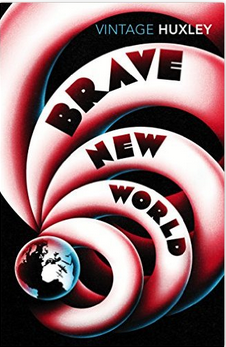 What a striking cover!Aldous Huxley wrote Brave New World in 1931, with publication taking place in 1932. From the start, the novel sparked controversy, being banned in Ireland on the grounds of offensive language and anti-religious themes. Not much has changed in the decades since, with the novel becoming one of the most hotly debated books in America. Readers have been infuriated by its sexually explicit scenes and bad language. It has also been banned in India due to its sexual content.
What a striking cover!Aldous Huxley wrote Brave New World in 1931, with publication taking place in 1932. From the start, the novel sparked controversy, being banned in Ireland on the grounds of offensive language and anti-religious themes. Not much has changed in the decades since, with the novel becoming one of the most hotly debated books in America. Readers have been infuriated by its sexually explicit scenes and bad language. It has also been banned in India due to its sexual content.
As if that weren't enough, in 1982 Polish author Antoni Smuszkiewicz accused Huxley of plagiarism, citing two Polish novels written in the 1920s. According to him, their similarity to Brave New World was so great that Huxley must have poached their plots. It's definitely a controversial book!
Here's a synopsis:
Far in the future, the World Controllers have created the ideal society. Through clever use of genetic engineering, brainwashing and recreational sex and drugs all its members are happy consumers. Bernard Marx seems alone harbouring an ill-defined longing to break free. A visit to one of the few remaining Savage Reservations where the old, imperfect life still continues, may be the cure for his distress...
Sounds fascinating! I can't believe I've not yet read this classic novel, so it's going on my list.
2. Ulysses, by James Joyce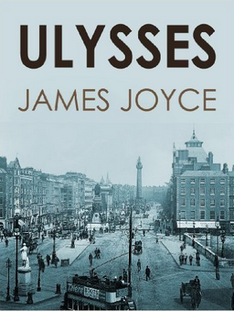 Ulysses first appeared in serial form and was then published as a novel in 1922 in Paris. Why France, when Joyce was Irish and the serialisation took place in an American journal? Controversial from the start, the book was banned in Ireland, the United States and Britain because it was considered obscene. As well as sexual imagery, Ulysses includes detailed descriptions of bodily functions such as masturbation, menstruation and defecation.
Ulysses first appeared in serial form and was then published as a novel in 1922 in Paris. Why France, when Joyce was Irish and the serialisation took place in an American journal? Controversial from the start, the book was banned in Ireland, the United States and Britain because it was considered obscene. As well as sexual imagery, Ulysses includes detailed descriptions of bodily functions such as masturbation, menstruation and defecation.
The book recounts the various events which befall Leopold Bloom and Stephen Dedalus in Dublin on 16 June 1904, including Bloom's wife, Molly, committing adultery. Hailed by critics such as T S Eliot yet reviled by others, e.g. Virginia Woolf, the serialised version was the subject of an obscenity trial in the US, leading to the novel being banned in that country. Copies were burned and incoming shipments were seized by customs officials. In the 1930s a US court ruling overturned the obscenity charge, making America the first English-speaking country to allow the book.
What fascinates me is the unusual structure. Joyce divided Ulysses into eighteen chapters called episodes, saying he had "put in so many enigmas and puzzles that it will keep the professors busy for centuries arguing over what I meant". The characters and theme of each episode correspond to those in Homer's Odyssey.
Sounds intriguing - another one for my reading list!
3. Lady Chatterley's Lover, by D H Lawrence
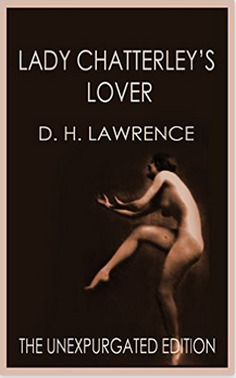 First published in Italy in 1928, the full version of Lady Chatterley's Lover didn't appear in the UK until 1960. Upon its release, the publishers, Penguin Books, were tried under The Obscene Publications Act 1959, making this an important test case for the new law. The book had become notorious for its story of the relationship between two individuals from different social classes, explicit descriptions of sex and profanity. The verdict, a triumph for common sense and literary freedom in my opinion, was a 'not guilty' one.
First published in Italy in 1928, the full version of Lady Chatterley's Lover didn't appear in the UK until 1960. Upon its release, the publishers, Penguin Books, were tried under The Obscene Publications Act 1959, making this an important test case for the new law. The book had become notorious for its story of the relationship between two individuals from different social classes, explicit descriptions of sex and profanity. The verdict, a triumph for common sense and literary freedom in my opinion, was a 'not guilty' one.
To twenty-first century readers, the book won't deliver the same kind of shock it did in the nineteen twenties. Back then, the sexual content and swearing held far more power to offend, but I suspect the main reason for the disapproval it generated was the story's crossing of class divisions. The book has also been banned and featured in obscenity trials in Australia, America, Japan, India and Canada.
Here's a synopsis:
Constance Reid marries Sir Clifford Chatterley, who becomes paralysed from the waist down after the First World War. Desperate for an heir and embarrassed by his inability to satisfy his wife sexually, Clifford gives the go-ahead for her to have an affair, envisaging she will choose someone from their immediate social circle. Instead, Constance begins a passionate relationship with their married gamekeeper, Oliver Mellors, inciting Clifford's ingrained class prejudices. The story ends with Mellors working on a farm, waiting for his divorce, with Connie, now pregnant, living with her sister. The expectation is that, eventually, they will be together.
4. Tropic of Cancer, by Henry Miller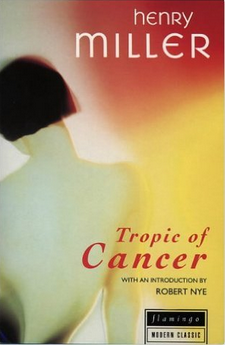 Henry Miller wrote Tropic of Cancer in the early 1930s, and it was originally published in Paris in 1934. The book was banned in the US for more than thirty years because it was considered pornographic. Grove Press published it in America in 1961, leading to more than sixty obscenity trials until (finally!) the Supreme Court ruled it a work of literature in 1964.
Henry Miller wrote Tropic of Cancer in the early 1930s, and it was originally published in Paris in 1934. The book was banned in the US for more than thirty years because it was considered pornographic. Grove Press published it in America in 1961, leading to more than sixty obscenity trials until (finally!) the Supreme Court ruled it a work of literature in 1964.
Other English-speaking countries, such as Canada and the UK, banned Tropic of Cancer. Only smuggled copies of the book were available in the United Kingdom from 1934 onwards. Scotland Yard contemplated banning its publication in Britain in the 1960s, but decided against the move because people like T S Eliot were ready to defend the book publicly. Another victory for literary freedom!
So what was all the fuss about? Set in Paris in the 1930s, the book is largely autobiograpical, featuring a starving American writer who lives a bohemian life among prostitutes, pimps, and artists. Meaning lots of sex - oh, the horror! Miller gave the following explanation of the book's unusual title. "To me cancer symbolises the disease of civilisation, the endpoint of the wrong path, the necessity to change course radically, to start completely over from scratch.”
Yet another one to add to my reading list!5. Lolita, by Vladimir Nabokov
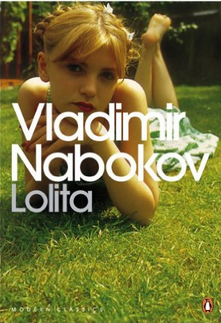 Lolita was written in English by its Russian author, Vladimir Nabokov, and first published in Paris in 1955. It seems French attitudes to controversial subjects are more relaxed than those of the US and UK. I can't help noticing how the books I'm featuring in this post often gained acceptance first in Paris.
Lolita was written in English by its Russian author, Vladimir Nabokov, and first published in Paris in 1955. It seems French attitudes to controversial subjects are more relaxed than those of the US and UK. I can't help noticing how the books I'm featuring in this post often gained acceptance first in Paris.
American and English versions followed in 1958 and 1959. The initial reaction was mixed. Graham Greene, in the Sunday Times, called it one of the three best books of 1955, whereas John Gordon, editor of the Sunday Express, dubbed it the filthiest book he had ever read. The Home Office promptly seized all copies entering the UK, and in 1956 France banned Lolita for two years, thus blotting their liberal copybook. The US, however, reacted differently, and the book has never been banned there.
A novel about a man who marries a woman so he can embark upon a relationship with her twelve-year-old daughter is bound to be controversial. The furore rumbles on today; recent sex abuse cases coming to light have ensured the book remains a source of debate. Critics disagree as to whether Lolita was a victim or a willing participant in her sexual relationship with the protagonist Humbert Humbert. Some have interpreted their liaison not as the corruption of an innocent child by a cunning adult, but the exploitation of a weak adult by a corrupt child. Others have labelled Humbert a rapist and paedophile. The book's influence is such that the name Lolita has passed into common usage to describe a sexually provocative young girl.
Let's hear from you!
Have you read any of the books I've featured in this post? Do any of them offend you? Or perhaps you consider them victims of outmoded thinking? Leave a comment and let me know!
Enjoyed this post? Please share via the links below Why not sign up for my blog?
If you've enjoyed this post, how about subscribing to my blog via RSS feed or email? Either click the links in my blog sidebar or sign up via Networked Blogs, also in the sidebar. It'll be great to have you on board!
Get a free copy of His Kidnapper's Shoes!
 Sign up for my newsletter and you'll receive a free copy of His Kidnapper's Shoes in either Kindle, epub or PDF format! What will you get from my emails? Books from other novelists (with their permission, of course!), reading recommendations, discounts on my future releases, as well as promotions and giveaways. I'll contact you every two months or when I release a new title, and will never divulge your details to any third parties. To sign up, click this link. Thank you!
Sign up for my newsletter and you'll receive a free copy of His Kidnapper's Shoes in either Kindle, epub or PDF format! What will you get from my emails? Books from other novelists (with their permission, of course!), reading recommendations, discounts on my future releases, as well as promotions and giveaways. I'll contact you every two months or when I release a new title, and will never divulge your details to any third parties. To sign up, click this link. Thank you!
The difficulty for this post was, of course, narrowing my selection down to five! Authors have frequently challenged prevailing social attitudes, giving me a deep pool from which to make my selection. Eventually I chose the following novels.
1. Brave New World, by Aldous Huxley
 What a striking cover!Aldous Huxley wrote Brave New World in 1931, with publication taking place in 1932. From the start, the novel sparked controversy, being banned in Ireland on the grounds of offensive language and anti-religious themes. Not much has changed in the decades since, with the novel becoming one of the most hotly debated books in America. Readers have been infuriated by its sexually explicit scenes and bad language. It has also been banned in India due to its sexual content.
What a striking cover!Aldous Huxley wrote Brave New World in 1931, with publication taking place in 1932. From the start, the novel sparked controversy, being banned in Ireland on the grounds of offensive language and anti-religious themes. Not much has changed in the decades since, with the novel becoming one of the most hotly debated books in America. Readers have been infuriated by its sexually explicit scenes and bad language. It has also been banned in India due to its sexual content.As if that weren't enough, in 1982 Polish author Antoni Smuszkiewicz accused Huxley of plagiarism, citing two Polish novels written in the 1920s. According to him, their similarity to Brave New World was so great that Huxley must have poached their plots. It's definitely a controversial book!
Here's a synopsis:
Far in the future, the World Controllers have created the ideal society. Through clever use of genetic engineering, brainwashing and recreational sex and drugs all its members are happy consumers. Bernard Marx seems alone harbouring an ill-defined longing to break free. A visit to one of the few remaining Savage Reservations where the old, imperfect life still continues, may be the cure for his distress...
Sounds fascinating! I can't believe I've not yet read this classic novel, so it's going on my list.
2. Ulysses, by James Joyce
 Ulysses first appeared in serial form and was then published as a novel in 1922 in Paris. Why France, when Joyce was Irish and the serialisation took place in an American journal? Controversial from the start, the book was banned in Ireland, the United States and Britain because it was considered obscene. As well as sexual imagery, Ulysses includes detailed descriptions of bodily functions such as masturbation, menstruation and defecation.
Ulysses first appeared in serial form and was then published as a novel in 1922 in Paris. Why France, when Joyce was Irish and the serialisation took place in an American journal? Controversial from the start, the book was banned in Ireland, the United States and Britain because it was considered obscene. As well as sexual imagery, Ulysses includes detailed descriptions of bodily functions such as masturbation, menstruation and defecation.The book recounts the various events which befall Leopold Bloom and Stephen Dedalus in Dublin on 16 June 1904, including Bloom's wife, Molly, committing adultery. Hailed by critics such as T S Eliot yet reviled by others, e.g. Virginia Woolf, the serialised version was the subject of an obscenity trial in the US, leading to the novel being banned in that country. Copies were burned and incoming shipments were seized by customs officials. In the 1930s a US court ruling overturned the obscenity charge, making America the first English-speaking country to allow the book.
What fascinates me is the unusual structure. Joyce divided Ulysses into eighteen chapters called episodes, saying he had "put in so many enigmas and puzzles that it will keep the professors busy for centuries arguing over what I meant". The characters and theme of each episode correspond to those in Homer's Odyssey.
Sounds intriguing - another one for my reading list!
3. Lady Chatterley's Lover, by D H Lawrence
 First published in Italy in 1928, the full version of Lady Chatterley's Lover didn't appear in the UK until 1960. Upon its release, the publishers, Penguin Books, were tried under The Obscene Publications Act 1959, making this an important test case for the new law. The book had become notorious for its story of the relationship between two individuals from different social classes, explicit descriptions of sex and profanity. The verdict, a triumph for common sense and literary freedom in my opinion, was a 'not guilty' one.
First published in Italy in 1928, the full version of Lady Chatterley's Lover didn't appear in the UK until 1960. Upon its release, the publishers, Penguin Books, were tried under The Obscene Publications Act 1959, making this an important test case for the new law. The book had become notorious for its story of the relationship between two individuals from different social classes, explicit descriptions of sex and profanity. The verdict, a triumph for common sense and literary freedom in my opinion, was a 'not guilty' one.To twenty-first century readers, the book won't deliver the same kind of shock it did in the nineteen twenties. Back then, the sexual content and swearing held far more power to offend, but I suspect the main reason for the disapproval it generated was the story's crossing of class divisions. The book has also been banned and featured in obscenity trials in Australia, America, Japan, India and Canada.
Here's a synopsis:
Constance Reid marries Sir Clifford Chatterley, who becomes paralysed from the waist down after the First World War. Desperate for an heir and embarrassed by his inability to satisfy his wife sexually, Clifford gives the go-ahead for her to have an affair, envisaging she will choose someone from their immediate social circle. Instead, Constance begins a passionate relationship with their married gamekeeper, Oliver Mellors, inciting Clifford's ingrained class prejudices. The story ends with Mellors working on a farm, waiting for his divorce, with Connie, now pregnant, living with her sister. The expectation is that, eventually, they will be together.
4. Tropic of Cancer, by Henry Miller
 Henry Miller wrote Tropic of Cancer in the early 1930s, and it was originally published in Paris in 1934. The book was banned in the US for more than thirty years because it was considered pornographic. Grove Press published it in America in 1961, leading to more than sixty obscenity trials until (finally!) the Supreme Court ruled it a work of literature in 1964.
Henry Miller wrote Tropic of Cancer in the early 1930s, and it was originally published in Paris in 1934. The book was banned in the US for more than thirty years because it was considered pornographic. Grove Press published it in America in 1961, leading to more than sixty obscenity trials until (finally!) the Supreme Court ruled it a work of literature in 1964.Other English-speaking countries, such as Canada and the UK, banned Tropic of Cancer. Only smuggled copies of the book were available in the United Kingdom from 1934 onwards. Scotland Yard contemplated banning its publication in Britain in the 1960s, but decided against the move because people like T S Eliot were ready to defend the book publicly. Another victory for literary freedom!
So what was all the fuss about? Set in Paris in the 1930s, the book is largely autobiograpical, featuring a starving American writer who lives a bohemian life among prostitutes, pimps, and artists. Meaning lots of sex - oh, the horror! Miller gave the following explanation of the book's unusual title. "To me cancer symbolises the disease of civilisation, the endpoint of the wrong path, the necessity to change course radically, to start completely over from scratch.”
Yet another one to add to my reading list!5. Lolita, by Vladimir Nabokov
 Lolita was written in English by its Russian author, Vladimir Nabokov, and first published in Paris in 1955. It seems French attitudes to controversial subjects are more relaxed than those of the US and UK. I can't help noticing how the books I'm featuring in this post often gained acceptance first in Paris.
Lolita was written in English by its Russian author, Vladimir Nabokov, and first published in Paris in 1955. It seems French attitudes to controversial subjects are more relaxed than those of the US and UK. I can't help noticing how the books I'm featuring in this post often gained acceptance first in Paris.American and English versions followed in 1958 and 1959. The initial reaction was mixed. Graham Greene, in the Sunday Times, called it one of the three best books of 1955, whereas John Gordon, editor of the Sunday Express, dubbed it the filthiest book he had ever read. The Home Office promptly seized all copies entering the UK, and in 1956 France banned Lolita for two years, thus blotting their liberal copybook. The US, however, reacted differently, and the book has never been banned there.
A novel about a man who marries a woman so he can embark upon a relationship with her twelve-year-old daughter is bound to be controversial. The furore rumbles on today; recent sex abuse cases coming to light have ensured the book remains a source of debate. Critics disagree as to whether Lolita was a victim or a willing participant in her sexual relationship with the protagonist Humbert Humbert. Some have interpreted their liaison not as the corruption of an innocent child by a cunning adult, but the exploitation of a weak adult by a corrupt child. Others have labelled Humbert a rapist and paedophile. The book's influence is such that the name Lolita has passed into common usage to describe a sexually provocative young girl.
Let's hear from you!
Have you read any of the books I've featured in this post? Do any of them offend you? Or perhaps you consider them victims of outmoded thinking? Leave a comment and let me know!
Enjoyed this post? Please share via the links below Why not sign up for my blog?
If you've enjoyed this post, how about subscribing to my blog via RSS feed or email? Either click the links in my blog sidebar or sign up via Networked Blogs, also in the sidebar. It'll be great to have you on board!
Get a free copy of His Kidnapper's Shoes!
 Sign up for my newsletter and you'll receive a free copy of His Kidnapper's Shoes in either Kindle, epub or PDF format! What will you get from my emails? Books from other novelists (with their permission, of course!), reading recommendations, discounts on my future releases, as well as promotions and giveaways. I'll contact you every two months or when I release a new title, and will never divulge your details to any third parties. To sign up, click this link. Thank you!
Sign up for my newsletter and you'll receive a free copy of His Kidnapper's Shoes in either Kindle, epub or PDF format! What will you get from my emails? Books from other novelists (with their permission, of course!), reading recommendations, discounts on my future releases, as well as promotions and giveaways. I'll contact you every two months or when I release a new title, and will never divulge your details to any third parties. To sign up, click this link. Thank you!
Published on March 02, 2016 06:28
February 17, 2016
Author interview - Patrick Parker
I'm delighted to welcome novelist Patrick Parker to my blog. Patrick has written two intriguing novels so far and is currently working on his third. Welcome, Patrick!
Thank you, Maggie, for your time and giving me the opportunity to talk with you.
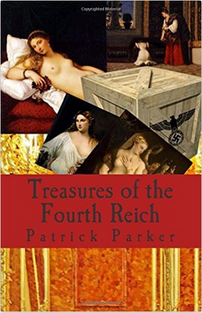 Tell us about yourself and your life to date.
Tell us about yourself and your life to date.
I retired from the US Army, then worked in the defense industry for fifteen years. My duty assignments took me to Italy, Germany, Panama, as well as the United States. My corporate work took me to Europe, across the United States and England. I am now settled in Texas, writing full time.
I enjoy scuba diving, sailing, going to the beach, and astronomy.
A challenge issued by your wife led to you writing Treasures of the Fourth Reich - can you elaborate?
I picked up a suspense book to read on the plane for a trip. This particular book, by one of the large publishing houses, was hyped as a “must read” and had several endorsements. I thought I couldn’t go wrong. However, I found numerous errors and holes in the plot. In some instances, the story line was not believable. When I returned home, in a conversation, my wife asked how I liked the book. I told her about it, and that I was disappointed. I made an offhanded comment that I could write a better book. She said flat out, “Why don’t you?”
Time passed and I began thinking of her comment, but doubt filled my head. A few travel excursions later, I bought another suspense book and it too, disappointed me. Then I was sent to Panama on a classified assignment. I stopped in at an art gallery hoping to buy a painting as a memento. The owner of the shop was active in the resistance against Manuel Noriega and looked to the United States to rescue her country. She told me at length, about the situation in the country. I found her fascinating. My trip to the isthmus did have many tense and exhilarating moments.
Soon after I returned, in one conversation, my wife asked me again if I was going to write a book. “It is harder than you think,” she said.I think she was just tired of me complaining of the quality of some books. Her comment was all it took. Panama was still fresh in my head and I thought the art dealer would make a very interesting character in a book. The idea took shape and Treasures of the Fourth Reich was born.
How far is the character of Maria Conner based on that art dealer you met in Panama?
Maria Conner is based on a real person in Panama. That person, I’ll call her Mary (not her real name), did own an art gallery. Mary was very vocal in her opposition to the Noriega regime. She intrigued me, although it was a bit frightening. Almost immediately, she asked me if I was going to save them. She began to tell me of the atrocities occurring there. She even told me she and a number of others were organized against the government. Her flat out statements were alarming. If we were overheard, I probably wouldn’t be here. Mary is about the same age as Maria Conner and, probably, much the same personality. Mary did have tragedy in her life as well.
Yes, I did buy a watercolor painting from her.
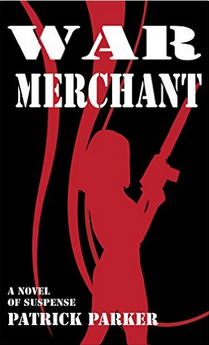 From where did you get the inspiration for the character of Dydre Rowyn in War Merchant?
From where did you get the inspiration for the character of Dydre Rowyn in War Merchant?
Dydre Rowyn is a combination of several women I knew from my work in the defense industry. I took from their personalities, traits, and background. Usually, the protagonist in a book like War Merchant is male. I thought a female would not only be a better twist but also add to the suspense. I didn’t want to have the usual stereotypical book. I knew it would be a challenge to maintain her femininity and it was. This character had to be smart, cunning, attractive, not cower when faced with danger, and deadly. I have known some female soldiers that were tougher than woodpecker lips. A female is more deadly than a male. So, after all that, Dydre came to life.
The excellent reviews and comments on my female protagonist, from women, tell me that I accomplished my goal with her.
What's next in your writing pipeline?
I am currently working on another suspense novel involving a drug cartel, which aids ISIS in a plan to attack the heartland of the United States. A former Special Operations officer, forced to resign from the Army, leads the planning and attack. I have captured the current political climate in Washington DC and have used some current events to make a relevant and believable story. This book promises to be another fast-paced, suspense-filled book that will keep you on the edge of your seat.
My writers group keeps telling me they’ll miss me when I’m carted away and placed in the witness protection program. I certainly hope they are wrong and I don’t disappear!
Your books so far have focused on issues of war. Will you write about other themes and in different genres in the future?
Yes, they have but I don’t want people to think they are war books.
I have been asked many times if some of my characters will return in another story. I would like to bring them back and have a few ideas to do just that. For the time being, I think I will stay in the suspense genre. Yes, that is a broad area and one I like and enjoy writing. I may bring a character(s) back for a crime story or mystery. For now, I have several ideas that incorporate politics, history, and current events. There is so much going on in the world now that you can’t make up. It is ripe for storytelling!
 How does your writing fit in with your non-writing life?
How does your writing fit in with your non-writing life?
That is a good question. If you ask my wife, she’ll tell you it infringes too much. I look at it as a full-time job and I am focused on the story at hand. It is time consuming, but if you want a good product, you must devote the time. I do get involved in a story and probably do drive everyone nuts until it is finished.
How do you see your writing career progressing? What are your literary aims and ambitions?
I plan to continue writing a book about every year or eighteen months. I want to continue growing as a writer, giving my readers quality stories that are believable and keep them on the edge of their seats. My stories are well suited for film and I would love to see them made into movies. I would like to do a series someday.
I am focused on the long-term, growing and keeping my readers. So far, the reviews have been great and I am very pleased with the feedback.
What's been the most joyful part to date of being a novelist?
The most joyful is getting my books published and reading the reviews. My mother, wife, and daughters are very proud of my accomplishments. That in itself is very gratifying. Some of my old friends and classmates are not only astounded that I am published but elated as well. I guess I just surprised everyone.
What are your top three strengths (as a person, not just as a writer). Your top three weaknesses?
My top three strengths are: I am very tenacious; I have great attention to detail; and I am disciplined. I want to produce quality work. Sometimes my tenaciousness and attention to detail consume too much time.
My three weaknesses are: I get impatient at times; I fret too much over the small things, which I have no control over; and incompetence drives me crazy. I do work on these weaknesses and try to keep them in check.
Thanks, Patrick! It's been a pleasure interviewing you.
Want to know more about Patrick and his books? Visit his blog at http://patrickparkerbooks.blogspot.co.uk/
Enjoyed this post? Please share via the links below:
Why not subscribe to my blog?If you've enjoyed this post, how about subscribing to my blog via RSS feed or email? Either click the links in my blog sidebar or sign up via Networked Blogs, also in the sidebar. It'll be great to have you on board!
Get your free copy of His Kidnapper's Shoes!
 Sign up for my newsletter and you'll receive a free copy of His Kidnapper's Shoes in either Kindle, epub or PDF format! What will you get from my emails? Books from other novelists (with their permission, of course!), reading recommendations, discounts on my future releases, as well as promotions and giveaways. I'll contact you every two months or when I release a new title, and will never divulge your details to any third parties. To sign up, click this link. Thank you!
Sign up for my newsletter and you'll receive a free copy of His Kidnapper's Shoes in either Kindle, epub or PDF format! What will you get from my emails? Books from other novelists (with their permission, of course!), reading recommendations, discounts on my future releases, as well as promotions and giveaways. I'll contact you every two months or when I release a new title, and will never divulge your details to any third parties. To sign up, click this link. Thank you!
Thank you, Maggie, for your time and giving me the opportunity to talk with you.
 Tell us about yourself and your life to date.
Tell us about yourself and your life to date.I retired from the US Army, then worked in the defense industry for fifteen years. My duty assignments took me to Italy, Germany, Panama, as well as the United States. My corporate work took me to Europe, across the United States and England. I am now settled in Texas, writing full time.
I enjoy scuba diving, sailing, going to the beach, and astronomy.
A challenge issued by your wife led to you writing Treasures of the Fourth Reich - can you elaborate?
I picked up a suspense book to read on the plane for a trip. This particular book, by one of the large publishing houses, was hyped as a “must read” and had several endorsements. I thought I couldn’t go wrong. However, I found numerous errors and holes in the plot. In some instances, the story line was not believable. When I returned home, in a conversation, my wife asked how I liked the book. I told her about it, and that I was disappointed. I made an offhanded comment that I could write a better book. She said flat out, “Why don’t you?”
Time passed and I began thinking of her comment, but doubt filled my head. A few travel excursions later, I bought another suspense book and it too, disappointed me. Then I was sent to Panama on a classified assignment. I stopped in at an art gallery hoping to buy a painting as a memento. The owner of the shop was active in the resistance against Manuel Noriega and looked to the United States to rescue her country. She told me at length, about the situation in the country. I found her fascinating. My trip to the isthmus did have many tense and exhilarating moments.
Soon after I returned, in one conversation, my wife asked me again if I was going to write a book. “It is harder than you think,” she said.I think she was just tired of me complaining of the quality of some books. Her comment was all it took. Panama was still fresh in my head and I thought the art dealer would make a very interesting character in a book. The idea took shape and Treasures of the Fourth Reich was born.
How far is the character of Maria Conner based on that art dealer you met in Panama?
Maria Conner is based on a real person in Panama. That person, I’ll call her Mary (not her real name), did own an art gallery. Mary was very vocal in her opposition to the Noriega regime. She intrigued me, although it was a bit frightening. Almost immediately, she asked me if I was going to save them. She began to tell me of the atrocities occurring there. She even told me she and a number of others were organized against the government. Her flat out statements were alarming. If we were overheard, I probably wouldn’t be here. Mary is about the same age as Maria Conner and, probably, much the same personality. Mary did have tragedy in her life as well.
Yes, I did buy a watercolor painting from her.
 From where did you get the inspiration for the character of Dydre Rowyn in War Merchant?
From where did you get the inspiration for the character of Dydre Rowyn in War Merchant?Dydre Rowyn is a combination of several women I knew from my work in the defense industry. I took from their personalities, traits, and background. Usually, the protagonist in a book like War Merchant is male. I thought a female would not only be a better twist but also add to the suspense. I didn’t want to have the usual stereotypical book. I knew it would be a challenge to maintain her femininity and it was. This character had to be smart, cunning, attractive, not cower when faced with danger, and deadly. I have known some female soldiers that were tougher than woodpecker lips. A female is more deadly than a male. So, after all that, Dydre came to life.
The excellent reviews and comments on my female protagonist, from women, tell me that I accomplished my goal with her.
What's next in your writing pipeline?
I am currently working on another suspense novel involving a drug cartel, which aids ISIS in a plan to attack the heartland of the United States. A former Special Operations officer, forced to resign from the Army, leads the planning and attack. I have captured the current political climate in Washington DC and have used some current events to make a relevant and believable story. This book promises to be another fast-paced, suspense-filled book that will keep you on the edge of your seat.
My writers group keeps telling me they’ll miss me when I’m carted away and placed in the witness protection program. I certainly hope they are wrong and I don’t disappear!
Your books so far have focused on issues of war. Will you write about other themes and in different genres in the future?
Yes, they have but I don’t want people to think they are war books.
I have been asked many times if some of my characters will return in another story. I would like to bring them back and have a few ideas to do just that. For the time being, I think I will stay in the suspense genre. Yes, that is a broad area and one I like and enjoy writing. I may bring a character(s) back for a crime story or mystery. For now, I have several ideas that incorporate politics, history, and current events. There is so much going on in the world now that you can’t make up. It is ripe for storytelling!
 How does your writing fit in with your non-writing life?
How does your writing fit in with your non-writing life?That is a good question. If you ask my wife, she’ll tell you it infringes too much. I look at it as a full-time job and I am focused on the story at hand. It is time consuming, but if you want a good product, you must devote the time. I do get involved in a story and probably do drive everyone nuts until it is finished.
How do you see your writing career progressing? What are your literary aims and ambitions?
I plan to continue writing a book about every year or eighteen months. I want to continue growing as a writer, giving my readers quality stories that are believable and keep them on the edge of their seats. My stories are well suited for film and I would love to see them made into movies. I would like to do a series someday.
I am focused on the long-term, growing and keeping my readers. So far, the reviews have been great and I am very pleased with the feedback.
What's been the most joyful part to date of being a novelist?
The most joyful is getting my books published and reading the reviews. My mother, wife, and daughters are very proud of my accomplishments. That in itself is very gratifying. Some of my old friends and classmates are not only astounded that I am published but elated as well. I guess I just surprised everyone.
What are your top three strengths (as a person, not just as a writer). Your top three weaknesses?
My top three strengths are: I am very tenacious; I have great attention to detail; and I am disciplined. I want to produce quality work. Sometimes my tenaciousness and attention to detail consume too much time.
My three weaknesses are: I get impatient at times; I fret too much over the small things, which I have no control over; and incompetence drives me crazy. I do work on these weaknesses and try to keep them in check.
Thanks, Patrick! It's been a pleasure interviewing you.
Want to know more about Patrick and his books? Visit his blog at http://patrickparkerbooks.blogspot.co.uk/
Enjoyed this post? Please share via the links below:
Why not subscribe to my blog?If you've enjoyed this post, how about subscribing to my blog via RSS feed or email? Either click the links in my blog sidebar or sign up via Networked Blogs, also in the sidebar. It'll be great to have you on board!
Get your free copy of His Kidnapper's Shoes!
 Sign up for my newsletter and you'll receive a free copy of His Kidnapper's Shoes in either Kindle, epub or PDF format! What will you get from my emails? Books from other novelists (with their permission, of course!), reading recommendations, discounts on my future releases, as well as promotions and giveaways. I'll contact you every two months or when I release a new title, and will never divulge your details to any third parties. To sign up, click this link. Thank you!
Sign up for my newsletter and you'll receive a free copy of His Kidnapper's Shoes in either Kindle, epub or PDF format! What will you get from my emails? Books from other novelists (with their permission, of course!), reading recommendations, discounts on my future releases, as well as promotions and giveaways. I'll contact you every two months or when I release a new title, and will never divulge your details to any third parties. To sign up, click this link. Thank you!
Published on February 17, 2016 02:49
February 10, 2016
Coming soon - audio versions of my books!
By Maggie JamesAudio - the fastest growing segment of the book publishing industry
 I'm delighted to say that by the end of 2016 all my current fiction titles, along with Write Your Novel! From Getting Started to First Draft, should be available in audiobook format. I'm very excited about this! The future of audiobooks appears promising, and I'm pleased to be a part of it. Amazon's sales from this sector last year was $1.5 billion, making it the fastest growing segment of the book publishing industry.
I'm delighted to say that by the end of 2016 all my current fiction titles, along with Write Your Novel! From Getting Started to First Draft, should be available in audiobook format. I'm very excited about this! The future of audiobooks appears promising, and I'm pleased to be a part of it. Amazon's sales from this sector last year was $1.5 billion, making it the fastest growing segment of the book publishing industry.
Such a phenomenon isn't surprising in our time-poor society. Many of us lead hectic lives and it can be hard for book-lovers to find time to indulge their passion. Enter the audiobook. Unlike electronic or printed versions, people don't need their hands to read, which opens up a whole range of possibilities. You can listen to audiobooks whilst exercising, walking the dog, on the subway, doing housework, travelling, etc., making them ultra convenient.
Audiobooks also suit those who can't, or prefer not to, read. For people with sight problems or dyslexia, the benefit is obvious. Others spend all day using a computer, and the last thing they want to do in their spare time is to use their eyes even more. Some people prefer to listen rather than to read; their brains are more geared towards auditory input.
Me? I don't buy audiobooks at present, although that may change. I read incredibly fast and I can also be impatient, meaning that audio is too slow for me. I don't do well with courses that are video- or MP3- based for the same reason. However, I'm considering trying audiobooks when I go travelling. Often I spend hour after hour on buses and trains and it would be good to listen to audiobooks, given that I'm not into music.The process so far - why the Queen won't be narrating my books
 So how far have I got in getting my books into audio format? Answer: I'm still at the beginning. I considered narrating them myself, but as I lack experience and a recording studio, that idea quickly got the boot. Instead, I've chosen to release my titles via ACX, an Amazon company. My experience using Amazon for my Kindle books has been very positive, meaning that for audio format ACX was my first port of call. They sell via Audible, the dominant sales platform for audiobooks, as well as Amazon and iTunes. That's pretty much the whole market sewn up!
So how far have I got in getting my books into audio format? Answer: I'm still at the beginning. I considered narrating them myself, but as I lack experience and a recording studio, that idea quickly got the boot. Instead, I've chosen to release my titles via ACX, an Amazon company. My experience using Amazon for my Kindle books has been very positive, meaning that for audio format ACX was my first port of call. They sell via Audible, the dominant sales platform for audiobooks, as well as Amazon and iTunes. That's pretty much the whole market sewn up!
First I had to join ACX and create a project for each book, as well as upload excerpts for all of them. This allows potential narrators to sample the book and then submit an audition. I started getting responses straight away, and soon realised there was more to this than I'd envisaged. I'd previously thought that because ACX narrators did this for a living they'd all have good, and therefore suitable, voices, so it didn't matter which one I chose. Wrong!
As I listened to samples left by the narrators, I developed a sense of what type of voice would fit my books. As I'm from the UK and all my fiction titles are set locally, it made sense to pick a British narrator. Many, though, had cut-glass 'received pronunciation' tones, as typified by our Queen, which isn't what I had in mind. (I suspect Her Majesty would be shocked by my books!) Instead, I was looking, or rather listening, for something more neutral.
Reading styles varied enormously. One man had a slow, ponderous delivery; before long, I wanted to fall asleep! Another narrator sounded bored with what she was reading - not good! I listened to many samples before I found a voice I liked; when I checked this woman's profile I was even more impressed. I'd been worried because some of my books, such as The Second Captive, contain chapters from both male and female viewpoints, but she's experienced in narrating both sexes. Oddly enough, she's American, but her English accent is spot on; I didn't realise she's from the USA until I checked her profile. I contacted her, gave her the links to my samples, and received this response:
'OMG! I love your title descriptions. Your books sound like ones I would pick to read on my own time. And thank you so much for the compliment on my British accent! Can't think of higher praise coming from a native Brit. I'd absolutely love to work together.' Wow! I was delighted.
For my non-fiction book, Write Your Novel! From Getting Started to First Draft, I've found a British guy with a wonderful voice that I think's a perfect fit. He's accepted my offer, so things are under way. There's a chance he may also record Blackwater Lake, a story told wholly from a male viewpoint. We'll see!
So far, I've agreed terms and production schedules for Write Your Novel! and Sister, Psychopath, with completion dates of March 31 and April 30 respectively. My other fiction titles will follow as and when my American narrator can fit them into her schedule. As an ACX-accredited producer, she's deservedly popular, and therefore booked well ahead. I'm optimistic, however, that they'll be released in audio format before long. I'll keep you posted!
Do you listen to audiobooks?
I'm curious as to how many of you listen to audiobooks. Do you use them whilst excercising, travelling, etc., or simply listen? What's your preference - written or audiobooks? Leave a comment and let me know!
Enjoyed this post? Please share via the links below: Why not sign up for my blog?
If you've enjoyed this post, how about subscribing to my blog via RSS feed or email? Either click the links in my blog sidebar or sign up via Networked Blogs, also in the sidebar. It'll be great to have you on board!
Get your free copy of His Kidnapper's Shoes!
 Sign up for my newsletter and you'll receive a free copy of His Kidnapper's Shoes in either Kindle, epub or PDF format! What will you get from my emails? Books from other novelists (with their permission, of course!), reading recommendations, discounts on my future releases, as well as promotions and giveaways. I'll contact you every two months or when I release a new title, and will never divulge your details to any third parties. To sign up, click this link. Thank you!
Sign up for my newsletter and you'll receive a free copy of His Kidnapper's Shoes in either Kindle, epub or PDF format! What will you get from my emails? Books from other novelists (with their permission, of course!), reading recommendations, discounts on my future releases, as well as promotions and giveaways. I'll contact you every two months or when I release a new title, and will never divulge your details to any third parties. To sign up, click this link. Thank you!
 I'm delighted to say that by the end of 2016 all my current fiction titles, along with Write Your Novel! From Getting Started to First Draft, should be available in audiobook format. I'm very excited about this! The future of audiobooks appears promising, and I'm pleased to be a part of it. Amazon's sales from this sector last year was $1.5 billion, making it the fastest growing segment of the book publishing industry.
I'm delighted to say that by the end of 2016 all my current fiction titles, along with Write Your Novel! From Getting Started to First Draft, should be available in audiobook format. I'm very excited about this! The future of audiobooks appears promising, and I'm pleased to be a part of it. Amazon's sales from this sector last year was $1.5 billion, making it the fastest growing segment of the book publishing industry.Such a phenomenon isn't surprising in our time-poor society. Many of us lead hectic lives and it can be hard for book-lovers to find time to indulge their passion. Enter the audiobook. Unlike electronic or printed versions, people don't need their hands to read, which opens up a whole range of possibilities. You can listen to audiobooks whilst exercising, walking the dog, on the subway, doing housework, travelling, etc., making them ultra convenient.
Audiobooks also suit those who can't, or prefer not to, read. For people with sight problems or dyslexia, the benefit is obvious. Others spend all day using a computer, and the last thing they want to do in their spare time is to use their eyes even more. Some people prefer to listen rather than to read; their brains are more geared towards auditory input.
Me? I don't buy audiobooks at present, although that may change. I read incredibly fast and I can also be impatient, meaning that audio is too slow for me. I don't do well with courses that are video- or MP3- based for the same reason. However, I'm considering trying audiobooks when I go travelling. Often I spend hour after hour on buses and trains and it would be good to listen to audiobooks, given that I'm not into music.The process so far - why the Queen won't be narrating my books
 So how far have I got in getting my books into audio format? Answer: I'm still at the beginning. I considered narrating them myself, but as I lack experience and a recording studio, that idea quickly got the boot. Instead, I've chosen to release my titles via ACX, an Amazon company. My experience using Amazon for my Kindle books has been very positive, meaning that for audio format ACX was my first port of call. They sell via Audible, the dominant sales platform for audiobooks, as well as Amazon and iTunes. That's pretty much the whole market sewn up!
So how far have I got in getting my books into audio format? Answer: I'm still at the beginning. I considered narrating them myself, but as I lack experience and a recording studio, that idea quickly got the boot. Instead, I've chosen to release my titles via ACX, an Amazon company. My experience using Amazon for my Kindle books has been very positive, meaning that for audio format ACX was my first port of call. They sell via Audible, the dominant sales platform for audiobooks, as well as Amazon and iTunes. That's pretty much the whole market sewn up!First I had to join ACX and create a project for each book, as well as upload excerpts for all of them. This allows potential narrators to sample the book and then submit an audition. I started getting responses straight away, and soon realised there was more to this than I'd envisaged. I'd previously thought that because ACX narrators did this for a living they'd all have good, and therefore suitable, voices, so it didn't matter which one I chose. Wrong!
As I listened to samples left by the narrators, I developed a sense of what type of voice would fit my books. As I'm from the UK and all my fiction titles are set locally, it made sense to pick a British narrator. Many, though, had cut-glass 'received pronunciation' tones, as typified by our Queen, which isn't what I had in mind. (I suspect Her Majesty would be shocked by my books!) Instead, I was looking, or rather listening, for something more neutral.
Reading styles varied enormously. One man had a slow, ponderous delivery; before long, I wanted to fall asleep! Another narrator sounded bored with what she was reading - not good! I listened to many samples before I found a voice I liked; when I checked this woman's profile I was even more impressed. I'd been worried because some of my books, such as The Second Captive, contain chapters from both male and female viewpoints, but she's experienced in narrating both sexes. Oddly enough, she's American, but her English accent is spot on; I didn't realise she's from the USA until I checked her profile. I contacted her, gave her the links to my samples, and received this response:
'OMG! I love your title descriptions. Your books sound like ones I would pick to read on my own time. And thank you so much for the compliment on my British accent! Can't think of higher praise coming from a native Brit. I'd absolutely love to work together.' Wow! I was delighted.
For my non-fiction book, Write Your Novel! From Getting Started to First Draft, I've found a British guy with a wonderful voice that I think's a perfect fit. He's accepted my offer, so things are under way. There's a chance he may also record Blackwater Lake, a story told wholly from a male viewpoint. We'll see!
So far, I've agreed terms and production schedules for Write Your Novel! and Sister, Psychopath, with completion dates of March 31 and April 30 respectively. My other fiction titles will follow as and when my American narrator can fit them into her schedule. As an ACX-accredited producer, she's deservedly popular, and therefore booked well ahead. I'm optimistic, however, that they'll be released in audio format before long. I'll keep you posted!
Do you listen to audiobooks?
I'm curious as to how many of you listen to audiobooks. Do you use them whilst excercising, travelling, etc., or simply listen? What's your preference - written or audiobooks? Leave a comment and let me know!
Enjoyed this post? Please share via the links below: Why not sign up for my blog?
If you've enjoyed this post, how about subscribing to my blog via RSS feed or email? Either click the links in my blog sidebar or sign up via Networked Blogs, also in the sidebar. It'll be great to have you on board!
Get your free copy of His Kidnapper's Shoes!
 Sign up for my newsletter and you'll receive a free copy of His Kidnapper's Shoes in either Kindle, epub or PDF format! What will you get from my emails? Books from other novelists (with their permission, of course!), reading recommendations, discounts on my future releases, as well as promotions and giveaways. I'll contact you every two months or when I release a new title, and will never divulge your details to any third parties. To sign up, click this link. Thank you!
Sign up for my newsletter and you'll receive a free copy of His Kidnapper's Shoes in either Kindle, epub or PDF format! What will you get from my emails? Books from other novelists (with their permission, of course!), reading recommendations, discounts on my future releases, as well as promotions and giveaways. I'll contact you every two months or when I release a new title, and will never divulge your details to any third parties. To sign up, click this link. Thank you!
Published on February 10, 2016 02:42
February 3, 2016
Interview with Michael Allen Williamson
By Maggie James
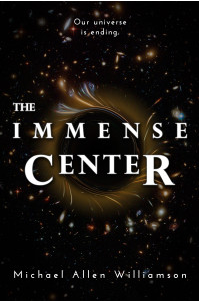 Today I'm delighted to welcome to my blog novelist Michael Allen Willamson. Michael is the author of the highly original science fiction novel The Immense Center. Let's get the party started!
Today I'm delighted to welcome to my blog novelist Michael Allen Willamson. Michael is the author of the highly original science fiction novel The Immense Center. Let's get the party started!
On your website, you describe yourself as being 5% troublemaker. Tell us about your wicked side.
I hate following the rules or doing things the way they've always been done. I have no patience for authority derived from position or status. I'm far more interested in progress and new ideas. I'm more interested in thinking about what is to be done from the position of good ideas based on the merit of the idea, not the authority of the person giving the idea. So, I'm often the one rocking the boat. I'm a troublemaker only to the extent that I won't blindly follow somebody else's rules just because they say so. If I understand and agree with the rules, then it makes sense to follow them.
For example, when it comes to writing, the internet is full of "10 Rules for Good Writing" and "The One Writing Rule You Should Know." Link-bait titles, for sure, but the very notion that there are rules to writing, grammar, and language rubs my very soul sore. You can't create anything original or new by following the rules. Of course, knowing the rules can help know how to break them, but most of the time, rules are just somebody else telling me how to do my thing.
I generally draw the line at breaking the law, though. For a variety of reasons, I'm a stickler to the law. It's certainly less risky that way. Although, I reserve the right to even rebel against the law if I find it egregiously unjust. I haven't encountered laws like this yet.
Will The Immense Center be a standalone novel or do you have plans for a sequel or a series?
I have no plans of creating a sequel to The Immense Center. However, there are mentions of other worlds and ideas for other stories hidden in the book. The next few fiction books I write will have their catalyst in the events of The Immense Center; you could say that they are in-universe. But, the stories and the plots will be completely their own. For example, there is mention in The Immense Center of The Grays and how they came to visit Earth. I think there's a story there. There are others that are also very interesting and intriguing to me. But, the next project is non-fiction and is occupying my time, so I have to let those ideas simmer a bit and return to them later. But, because writing fiction is so therapeutic for me, I'll probably be dabbling in these stories soon.
From where do you draw your inspiration and ideas?
Wow, what a difficult question. I'm a liar. I had a rough childhood and making shit up was my way of coping. I found I could impress people with utter fiction and have some meager respect or friendship from them. But, ultimately, I was telling lies. As I grew older, I struggled with this very deep pattern and habit. Writing stories for me is a way to take my ability to invent, create, and imagine and put it to good use. I've always imagined other worlds and strange scenarios as a way to help myself get to sleep. I've read plenty of imaginative books from Tolkien and Lewis and others. I've watched many imaginative movies and played many imaginative games. All of that feeds into this system that needs an outlet and writing is one of those ways I let all that stuff out.
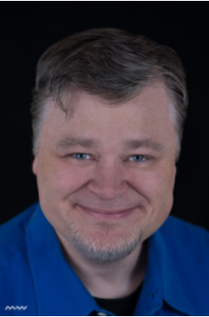 Describe a typical working day for you as a writer.
Describe a typical working day for you as a writer.
I could never write full time, so my typical working day is filled with all kinds of things. I am what is called a polymath. Writing to me is an expression of my imagination and creativity. But, it isn't the only expression of my creativity. I am also an inventor, artist, photographer, composer, and designer. So, my typical day is spent being creative and desperately trying to find a little money to pay the bills. The first part comes naturally, the second part isn't so easy.
When I'm writing, however, it's a blessing. I've found a system that works for me and I just dive in. No formatting, no self-editing, no agenda; I just write. Later, I put all the pieces together to get it published. And, that's the hard part. Publishing a book is 5% writing and 95% everything else.
To what extent did you wrestle with your personal beliefs and issues when writing the book?
Immensely. I don't mean to make light of this with my pun, but this book was seven years in the making. I wrestled with many of my personal beliefs through those years and where I am currently is a significantly different place than where I started. I've spent a lot of time in the Christian Church and most of that time was painful and hard. I found more reasons for depression and anger by being involved with the Christian Church than with any other group of people I've ever encountered. Fundamentally, I was so tired of the 6-day-creation, anti-science, conservative, evangelical, American church. I was tired of their sniper-style assault on sexuality and their blind eye to gossip, slander, and pride. I needed to find my own way. The Immense Center is a new way of thinking about things, a new start for me, a bold look at belief and religion and science and humanity. Did I get it right? Probably not. Did it help me grow? Absolutely.
Given your life-long interest in science fiction, can you see yourself writing in other genres?
Most definitely. As I mentioned above, I have a diverse range of interests. So, my next book is non-fiction. After that, I have a few fantasy book ideas. I have a few book ideas that are a mix of science fiction and fantasy. I have some post-apocalyptic book ideas. I have some spy novel ideas. And, I have a memoir-style-paranormal book idea. The whole point is actively engaging the imagination, and to not limit myself.
Yes, I know that multi-genre authors are a bad idea and that audiences don't like that. Well, this is one of those rules I don't like. And I suspect most authors would love to branch out like J.K Rowling and Steven King do under pseudonyms. But, when you think of it, early literature wasn't sliced and divided into genre. This is an invention of the 20th century and I think it's time for something new. I think the audience can adapt, they're smart people and they have just as diverse interests as the authors. The publishing industry is already going through dramatic change, I see this as part of it... but then again, I'm 5% troublemaker.
 How does writing tie in with your family life and your roles as husband and father?
How does writing tie in with your family life and your roles as husband and father?
Well first, we go camping and I tell stories around the campfire. This is the source of my first two books, which are children's novelettes (published under the nom de plume, Professor MacKay). But, more so, I am very serious about my children finding their passion and actively engaging their imagination. Both of my sons have started writing and my oldest is in a writing club at his school. Their skill is far greater than mine was at that age and I couldn't be prouder. But, they may never become professional authors or writers, and I'm okay with that. I see their imagination is strong and their creativity is deep. Whatever they decide to do, I know those two tools will aid them.
But, the same applies to my relationship with my wife. Applying a little imagination in a marriage is good. It helps us dream and set goals. It also helps us find creative ways to have fun. But, I don't think we should get too deep into that.
How are you finding life as an author and what have been the reactions from family, friends and the reading public?
Life as an author isn't really any different than life as any other profession. It's a lot of hard work. It's scary. It isn't secure. It requires a degree of tenacity to be successful. But, I contend, every profession on the planet is the same. Yes, I'm not a full-time employee of someone else. Yes, I have to "scrape by" most of the time. Yes, I have to deal with a lot of business that I don't like. That really isn't different from holding a corporate job except I'm not holding on to the illusion of safety.
It's hard for my family, but good-hard, not bad-hard. My family has come to realize that when it gets down to the nitty-gritty, we work well as a team. We have a synergy and choreography that we fall into to get things done. It requires taking risks and trying something hard to discover this kind of thing about a family, but I believe this is what families are made for.
Like you, I have been criticised for profanity in my writing, and like you I am unapologetic. Tell us why you feel that way.
Declaring some words as "profane" and others and "acceptable" is an unreasonable human convention (see above). There is actual hard science that shows that using profanity acts as an analgesic. It also has the affect of making one more approachable by those that don't feel like they have it all together.
But, the real reason I use profanity in my writing is that I use it in real life. If I left it out of my writing, it would sound stilted and fake. Especially for The Immense Center, I needed the protagonist to be very relatable. So, "Holy Shit!" and "No way in hell..." show up in the book. But, otherwise, it's fairly mild. I have plans for future books that won't be so mild, so I guess this little bit of profanity will be a warning to the profanity-sensitive audience.
The Immense Center has a beautiful cover - did you design it yourself or did you hire someone?
I designed the cover myself. As I mentioned before, I'm a designer and I've worked professionally as a designer for nearly 20 years. I had intended to hire somebody, but when I mocked up the cover for my business coach and my business manager, they both agreed that this was the cover to use. It went through several refinements before arriving at the final cover, but altogether, I couldn't spend too much time on it. So, the final cover is completely me and saved us the cost of a cover designer (which ultimately helps the author, right?)
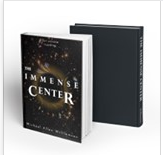 Thank you, Michael!
Thank you, Michael!
It's been good to talk to you! For those of you who'd like to know more, here's a synopsis of The Immense Center:
There's more than one universe and most of them will be coming to an end. Time is accelerating, the multiple dimensions are collapsing and all existences will cease. But, there is a way to escape. Multidimensional, time-traveling beings are working to help humans and extraterrestrials from every galaxy in every possible universe escape the end. Another group of multidimensional, time-traveling beings don't want this plan to succeed. Go on an adventure through time and other universes to meet interesting people and creatures on other planets and in other timelines. Join the fight against the ones causing the destruction. Meet the truth head-on and find a way to escape.
Here are Michael's website and social media links:
Website: http://author.michaelallenwilliamson.com
Twitter: @mawauthor
Facebook: facebook.com/mawauthor
Google+: http://gplus.michaelallenwilliamson.com/
Like this post? Please share via the links below: Why not subscribe to my blog?If you've enjoyed this post, how about subscribing to my blog via RSS feed or email? Either click the links in my blog sidebar or sign up via Networked Blogs, also in the sidebar. It'll be great to have you on board!
Get your free copy of His Kidnapper's Shoes! Sign up for my newsletter and you'll receive a free copy of His Kidnapper's Shoes in either Kindle, epub or PDF format! What will you get from my emails? Books from other novelists (with their permission, of course!), reading recommendations, discounts on my future releases, as well as promotions and giveaways. I'll contact you every two months or when I release a new title, and will never divulge your details to any third parties. To sign up, click this link. Thank you!
Sign up for my newsletter and you'll receive a free copy of His Kidnapper's Shoes in either Kindle, epub or PDF format! What will you get from my emails? Books from other novelists (with their permission, of course!), reading recommendations, discounts on my future releases, as well as promotions and giveaways. I'll contact you every two months or when I release a new title, and will never divulge your details to any third parties. To sign up, click this link. Thank you!
 Today I'm delighted to welcome to my blog novelist Michael Allen Willamson. Michael is the author of the highly original science fiction novel The Immense Center. Let's get the party started!
Today I'm delighted to welcome to my blog novelist Michael Allen Willamson. Michael is the author of the highly original science fiction novel The Immense Center. Let's get the party started!On your website, you describe yourself as being 5% troublemaker. Tell us about your wicked side.
I hate following the rules or doing things the way they've always been done. I have no patience for authority derived from position or status. I'm far more interested in progress and new ideas. I'm more interested in thinking about what is to be done from the position of good ideas based on the merit of the idea, not the authority of the person giving the idea. So, I'm often the one rocking the boat. I'm a troublemaker only to the extent that I won't blindly follow somebody else's rules just because they say so. If I understand and agree with the rules, then it makes sense to follow them.
For example, when it comes to writing, the internet is full of "10 Rules for Good Writing" and "The One Writing Rule You Should Know." Link-bait titles, for sure, but the very notion that there are rules to writing, grammar, and language rubs my very soul sore. You can't create anything original or new by following the rules. Of course, knowing the rules can help know how to break them, but most of the time, rules are just somebody else telling me how to do my thing.
I generally draw the line at breaking the law, though. For a variety of reasons, I'm a stickler to the law. It's certainly less risky that way. Although, I reserve the right to even rebel against the law if I find it egregiously unjust. I haven't encountered laws like this yet.
Will The Immense Center be a standalone novel or do you have plans for a sequel or a series?
I have no plans of creating a sequel to The Immense Center. However, there are mentions of other worlds and ideas for other stories hidden in the book. The next few fiction books I write will have their catalyst in the events of The Immense Center; you could say that they are in-universe. But, the stories and the plots will be completely their own. For example, there is mention in The Immense Center of The Grays and how they came to visit Earth. I think there's a story there. There are others that are also very interesting and intriguing to me. But, the next project is non-fiction and is occupying my time, so I have to let those ideas simmer a bit and return to them later. But, because writing fiction is so therapeutic for me, I'll probably be dabbling in these stories soon.
From where do you draw your inspiration and ideas?
Wow, what a difficult question. I'm a liar. I had a rough childhood and making shit up was my way of coping. I found I could impress people with utter fiction and have some meager respect or friendship from them. But, ultimately, I was telling lies. As I grew older, I struggled with this very deep pattern and habit. Writing stories for me is a way to take my ability to invent, create, and imagine and put it to good use. I've always imagined other worlds and strange scenarios as a way to help myself get to sleep. I've read plenty of imaginative books from Tolkien and Lewis and others. I've watched many imaginative movies and played many imaginative games. All of that feeds into this system that needs an outlet and writing is one of those ways I let all that stuff out.
 Describe a typical working day for you as a writer.
Describe a typical working day for you as a writer.I could never write full time, so my typical working day is filled with all kinds of things. I am what is called a polymath. Writing to me is an expression of my imagination and creativity. But, it isn't the only expression of my creativity. I am also an inventor, artist, photographer, composer, and designer. So, my typical day is spent being creative and desperately trying to find a little money to pay the bills. The first part comes naturally, the second part isn't so easy.
When I'm writing, however, it's a blessing. I've found a system that works for me and I just dive in. No formatting, no self-editing, no agenda; I just write. Later, I put all the pieces together to get it published. And, that's the hard part. Publishing a book is 5% writing and 95% everything else.
To what extent did you wrestle with your personal beliefs and issues when writing the book?
Immensely. I don't mean to make light of this with my pun, but this book was seven years in the making. I wrestled with many of my personal beliefs through those years and where I am currently is a significantly different place than where I started. I've spent a lot of time in the Christian Church and most of that time was painful and hard. I found more reasons for depression and anger by being involved with the Christian Church than with any other group of people I've ever encountered. Fundamentally, I was so tired of the 6-day-creation, anti-science, conservative, evangelical, American church. I was tired of their sniper-style assault on sexuality and their blind eye to gossip, slander, and pride. I needed to find my own way. The Immense Center is a new way of thinking about things, a new start for me, a bold look at belief and religion and science and humanity. Did I get it right? Probably not. Did it help me grow? Absolutely.
Given your life-long interest in science fiction, can you see yourself writing in other genres?
Most definitely. As I mentioned above, I have a diverse range of interests. So, my next book is non-fiction. After that, I have a few fantasy book ideas. I have a few book ideas that are a mix of science fiction and fantasy. I have some post-apocalyptic book ideas. I have some spy novel ideas. And, I have a memoir-style-paranormal book idea. The whole point is actively engaging the imagination, and to not limit myself.
Yes, I know that multi-genre authors are a bad idea and that audiences don't like that. Well, this is one of those rules I don't like. And I suspect most authors would love to branch out like J.K Rowling and Steven King do under pseudonyms. But, when you think of it, early literature wasn't sliced and divided into genre. This is an invention of the 20th century and I think it's time for something new. I think the audience can adapt, they're smart people and they have just as diverse interests as the authors. The publishing industry is already going through dramatic change, I see this as part of it... but then again, I'm 5% troublemaker.
 How does writing tie in with your family life and your roles as husband and father?
How does writing tie in with your family life and your roles as husband and father?Well first, we go camping and I tell stories around the campfire. This is the source of my first two books, which are children's novelettes (published under the nom de plume, Professor MacKay). But, more so, I am very serious about my children finding their passion and actively engaging their imagination. Both of my sons have started writing and my oldest is in a writing club at his school. Their skill is far greater than mine was at that age and I couldn't be prouder. But, they may never become professional authors or writers, and I'm okay with that. I see their imagination is strong and their creativity is deep. Whatever they decide to do, I know those two tools will aid them.
But, the same applies to my relationship with my wife. Applying a little imagination in a marriage is good. It helps us dream and set goals. It also helps us find creative ways to have fun. But, I don't think we should get too deep into that.
How are you finding life as an author and what have been the reactions from family, friends and the reading public?
Life as an author isn't really any different than life as any other profession. It's a lot of hard work. It's scary. It isn't secure. It requires a degree of tenacity to be successful. But, I contend, every profession on the planet is the same. Yes, I'm not a full-time employee of someone else. Yes, I have to "scrape by" most of the time. Yes, I have to deal with a lot of business that I don't like. That really isn't different from holding a corporate job except I'm not holding on to the illusion of safety.
It's hard for my family, but good-hard, not bad-hard. My family has come to realize that when it gets down to the nitty-gritty, we work well as a team. We have a synergy and choreography that we fall into to get things done. It requires taking risks and trying something hard to discover this kind of thing about a family, but I believe this is what families are made for.
Like you, I have been criticised for profanity in my writing, and like you I am unapologetic. Tell us why you feel that way.
Declaring some words as "profane" and others and "acceptable" is an unreasonable human convention (see above). There is actual hard science that shows that using profanity acts as an analgesic. It also has the affect of making one more approachable by those that don't feel like they have it all together.
But, the real reason I use profanity in my writing is that I use it in real life. If I left it out of my writing, it would sound stilted and fake. Especially for The Immense Center, I needed the protagonist to be very relatable. So, "Holy Shit!" and "No way in hell..." show up in the book. But, otherwise, it's fairly mild. I have plans for future books that won't be so mild, so I guess this little bit of profanity will be a warning to the profanity-sensitive audience.
The Immense Center has a beautiful cover - did you design it yourself or did you hire someone?
I designed the cover myself. As I mentioned before, I'm a designer and I've worked professionally as a designer for nearly 20 years. I had intended to hire somebody, but when I mocked up the cover for my business coach and my business manager, they both agreed that this was the cover to use. It went through several refinements before arriving at the final cover, but altogether, I couldn't spend too much time on it. So, the final cover is completely me and saved us the cost of a cover designer (which ultimately helps the author, right?)
 Thank you, Michael!
Thank you, Michael!It's been good to talk to you! For those of you who'd like to know more, here's a synopsis of The Immense Center:
There's more than one universe and most of them will be coming to an end. Time is accelerating, the multiple dimensions are collapsing and all existences will cease. But, there is a way to escape. Multidimensional, time-traveling beings are working to help humans and extraterrestrials from every galaxy in every possible universe escape the end. Another group of multidimensional, time-traveling beings don't want this plan to succeed. Go on an adventure through time and other universes to meet interesting people and creatures on other planets and in other timelines. Join the fight against the ones causing the destruction. Meet the truth head-on and find a way to escape.
Here are Michael's website and social media links:
Website: http://author.michaelallenwilliamson.com
Twitter: @mawauthor
Facebook: facebook.com/mawauthor
Google+: http://gplus.michaelallenwilliamson.com/
Like this post? Please share via the links below: Why not subscribe to my blog?If you've enjoyed this post, how about subscribing to my blog via RSS feed or email? Either click the links in my blog sidebar or sign up via Networked Blogs, also in the sidebar. It'll be great to have you on board!
Get your free copy of His Kidnapper's Shoes!
 Sign up for my newsletter and you'll receive a free copy of His Kidnapper's Shoes in either Kindle, epub or PDF format! What will you get from my emails? Books from other novelists (with their permission, of course!), reading recommendations, discounts on my future releases, as well as promotions and giveaways. I'll contact you every two months or when I release a new title, and will never divulge your details to any third parties. To sign up, click this link. Thank you!
Sign up for my newsletter and you'll receive a free copy of His Kidnapper's Shoes in either Kindle, epub or PDF format! What will you get from my emails? Books from other novelists (with their permission, of course!), reading recommendations, discounts on my future releases, as well as promotions and giveaways. I'll contact you every two months or when I release a new title, and will never divulge your details to any third parties. To sign up, click this link. Thank you!
Published on February 03, 2016 02:22
January 20, 2016
When characters go their own way
By Maggie James
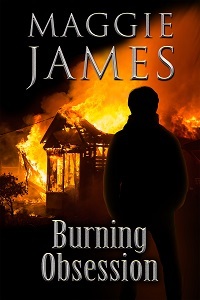 Recently I finished the first draft of my next novel, Burning Obsession, and along the way something odd happened. Many, if not all, other fiction writers report it's happened to them too; it's a concept that sounds a little off the wall, a bit wacky, at first. Readers who are not also writers tell me it's hard to understand, and I can see why. I'm talking about the tendency of fictional characters to resist doing what the author wants. Instead, just like real people, they often refuse to do what they're told, developing minds of their own and behaving in very contrary ways!
Recently I finished the first draft of my next novel, Burning Obsession, and along the way something odd happened. Many, if not all, other fiction writers report it's happened to them too; it's a concept that sounds a little off the wall, a bit wacky, at first. Readers who are not also writers tell me it's hard to understand, and I can see why. I'm talking about the tendency of fictional characters to resist doing what the author wants. Instead, just like real people, they often refuse to do what they're told, developing minds of their own and behaving in very contrary ways!
Fiction writers will know what I mean. For others, though, this is a weird notion. 'But you're the author!' they say. 'Aren't you in control? Why not just make the characters do what you'd planned for them?' The answer is, I can't, not always.
Let me explain. As a novelist, I’m an outliner, plotting my books in a fair amount of detail before I write them. As part of my planning, I prepare notes about each character - their motivations, their hopes, their issues, along with a physical description and a precis of their role in the plot. After I've done that, I tell myself I know them quite well, but the truth is, I don't. It's not until I start writing that they take on lives and minds of their own, and sometimes those minds decide to follow a different route through the novel.
If this all sounds a bit woo-woo, it is and yet it isn't. In one way, there's nothing mystical about what I'm describing. However carefully an author plots in advance, it's impossible to foresee every eventuality, and it's not until the writing begins that a novelist finds out whether his/her story works. What may appear feasible at the planning stage can unravel once written; inconsistencies and contradictions appear or the plot simply doesn't feel right. The same happens with characters.
I'll explain by using Jack Hamilton, a minor player in Burning Obsession. When I plotted the novel, Jack was a poor father, a lousy partner and an all-round deadbeat. As I wrote one particular scene, however, something didn't feel right. The storyline would work better, I decided, if I portrayed Jack as flawed in many ways, yet ultimately a man trying to do his best. Someone who regretted his past mistakes. So that's what I did. Nothing woo-woo about that, simply an author recognising that a different approach would suit the novel better.
On the other hand, though, Jack asserting his true character provided a magical moment. It was as if he was shouting at me, trying to get my attention, yelling, 'Hey! You behind the keyboard! You've got me all wrong - I'm more of a nice guy than you give me credit for!'
I hear you, Jack! And once I did, I changed my story accordingly. Characters don’t exist independently from an author's fiction, of course, however real they may become to a writer. The chances are, though, that if a character is pressing to go in a particular direction, then that's the best course for him/her to take.
Here's novelist Dianne Doubtfire on the subject:
'Sometimes a character becomes so real that he refuses to do what you have planned for him. When this happens, don't coerce him; it means you have created a real person with a will of his own and this is a marvellous moment in any novelist's life. Hold him on a light rein, as it were, giving him his head to a certain degree but ensuring that he does not stampede you out of your story.' (Dianne Doubtfire, The Craft of Novel-Writing, published by Allison and Busby, 1978).
Wise advice, Dianne - thank you! Oh, and a big thank you also to Jack Hamilton - I'm glad I listened to you!
(Burning Obsession will be published spring/summer 2016. To find out more, click here).
What do you think?Are you a fellow novelist who's had characters run out of control and do their own thing? Or are you a reader, someone who doesn't understand why authors can't exercise complete authority? Are there fictional characters who you think would have been more convincing if they'd been portrayed differently? Leave me a comment and let me know!Enjoyed this post? Please share via the links below:
Why not subscribe to my blog?
If you've enjoyed this post, how about subscribing to my blog via RSS feed or email? Either click the links in my blog sidebar or sign up via Networked Blogs, also in the sidebar. It'll be great to have you on board!Get your free copy of His Kidnapper's Shoes!
 Sign up for my newsletter and you'll receive a free copy of His Kidnapper's Shoes in either Kindle, epub or PDF format! What will you get from my emails? Books from other novelists (with their permission, of course!), reading recommendations, discounts on my future releases, as well as promotions and giveaways. I'll contact you every two months or when I release a new title, and will never divulge your details to any third parties. To sign up, click this link. Thank you!
Sign up for my newsletter and you'll receive a free copy of His Kidnapper's Shoes in either Kindle, epub or PDF format! What will you get from my emails? Books from other novelists (with their permission, of course!), reading recommendations, discounts on my future releases, as well as promotions and giveaways. I'll contact you every two months or when I release a new title, and will never divulge your details to any third parties. To sign up, click this link. Thank you!
 Recently I finished the first draft of my next novel, Burning Obsession, and along the way something odd happened. Many, if not all, other fiction writers report it's happened to them too; it's a concept that sounds a little off the wall, a bit wacky, at first. Readers who are not also writers tell me it's hard to understand, and I can see why. I'm talking about the tendency of fictional characters to resist doing what the author wants. Instead, just like real people, they often refuse to do what they're told, developing minds of their own and behaving in very contrary ways!
Recently I finished the first draft of my next novel, Burning Obsession, and along the way something odd happened. Many, if not all, other fiction writers report it's happened to them too; it's a concept that sounds a little off the wall, a bit wacky, at first. Readers who are not also writers tell me it's hard to understand, and I can see why. I'm talking about the tendency of fictional characters to resist doing what the author wants. Instead, just like real people, they often refuse to do what they're told, developing minds of their own and behaving in very contrary ways!Fiction writers will know what I mean. For others, though, this is a weird notion. 'But you're the author!' they say. 'Aren't you in control? Why not just make the characters do what you'd planned for them?' The answer is, I can't, not always.
Let me explain. As a novelist, I’m an outliner, plotting my books in a fair amount of detail before I write them. As part of my planning, I prepare notes about each character - their motivations, their hopes, their issues, along with a physical description and a precis of their role in the plot. After I've done that, I tell myself I know them quite well, but the truth is, I don't. It's not until I start writing that they take on lives and minds of their own, and sometimes those minds decide to follow a different route through the novel.
If this all sounds a bit woo-woo, it is and yet it isn't. In one way, there's nothing mystical about what I'm describing. However carefully an author plots in advance, it's impossible to foresee every eventuality, and it's not until the writing begins that a novelist finds out whether his/her story works. What may appear feasible at the planning stage can unravel once written; inconsistencies and contradictions appear or the plot simply doesn't feel right. The same happens with characters.
I'll explain by using Jack Hamilton, a minor player in Burning Obsession. When I plotted the novel, Jack was a poor father, a lousy partner and an all-round deadbeat. As I wrote one particular scene, however, something didn't feel right. The storyline would work better, I decided, if I portrayed Jack as flawed in many ways, yet ultimately a man trying to do his best. Someone who regretted his past mistakes. So that's what I did. Nothing woo-woo about that, simply an author recognising that a different approach would suit the novel better.
On the other hand, though, Jack asserting his true character provided a magical moment. It was as if he was shouting at me, trying to get my attention, yelling, 'Hey! You behind the keyboard! You've got me all wrong - I'm more of a nice guy than you give me credit for!'
I hear you, Jack! And once I did, I changed my story accordingly. Characters don’t exist independently from an author's fiction, of course, however real they may become to a writer. The chances are, though, that if a character is pressing to go in a particular direction, then that's the best course for him/her to take.
Here's novelist Dianne Doubtfire on the subject:
'Sometimes a character becomes so real that he refuses to do what you have planned for him. When this happens, don't coerce him; it means you have created a real person with a will of his own and this is a marvellous moment in any novelist's life. Hold him on a light rein, as it were, giving him his head to a certain degree but ensuring that he does not stampede you out of your story.' (Dianne Doubtfire, The Craft of Novel-Writing, published by Allison and Busby, 1978).
Wise advice, Dianne - thank you! Oh, and a big thank you also to Jack Hamilton - I'm glad I listened to you!
(Burning Obsession will be published spring/summer 2016. To find out more, click here).
What do you think?Are you a fellow novelist who's had characters run out of control and do their own thing? Or are you a reader, someone who doesn't understand why authors can't exercise complete authority? Are there fictional characters who you think would have been more convincing if they'd been portrayed differently? Leave me a comment and let me know!Enjoyed this post? Please share via the links below:
Why not subscribe to my blog?
If you've enjoyed this post, how about subscribing to my blog via RSS feed or email? Either click the links in my blog sidebar or sign up via Networked Blogs, also in the sidebar. It'll be great to have you on board!Get your free copy of His Kidnapper's Shoes!
 Sign up for my newsletter and you'll receive a free copy of His Kidnapper's Shoes in either Kindle, epub or PDF format! What will you get from my emails? Books from other novelists (with their permission, of course!), reading recommendations, discounts on my future releases, as well as promotions and giveaways. I'll contact you every two months or when I release a new title, and will never divulge your details to any third parties. To sign up, click this link. Thank you!
Sign up for my newsletter and you'll receive a free copy of His Kidnapper's Shoes in either Kindle, epub or PDF format! What will you get from my emails? Books from other novelists (with their permission, of course!), reading recommendations, discounts on my future releases, as well as promotions and giveaways. I'll contact you every two months or when I release a new title, and will never divulge your details to any third parties. To sign up, click this link. Thank you!
Published on January 20, 2016 01:50
January 6, 2016
Book review - The October List by Jeffery Deaver
By Maggie James
A novel told backwards!
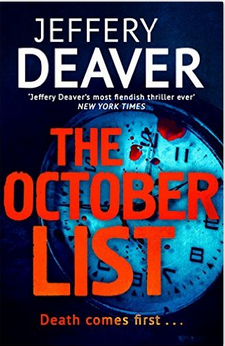 A while back, I wrote a post about novels with unusual structures (you can read it here), examining books such as B S Johnson's 'The Unfortunates', which consists of twenty-seven chapters that can be read in any order. As a novelist, I'm fascinated by examples of authors stretching the boundaries of what's possible with fiction. Last week, I picked up from the library another novel with an intriguing premise: Jeffery Deaver's 'The October List'.
A while back, I wrote a post about novels with unusual structures (you can read it here), examining books such as B S Johnson's 'The Unfortunates', which consists of twenty-seven chapters that can be read in any order. As a novelist, I'm fascinated by examples of authors stretching the boundaries of what's possible with fiction. Last week, I picked up from the library another novel with an intriguing premise: Jeffery Deaver's 'The October List'.
What's unusual about it? Well, the story is told in reverse - sounds weird, I know! The index begins with chapter chapter thirty-six, the story working back through time over the last two days to the first chapter. In his foreword, Deaver explains that he became captivated with the idea of reverse chronology after listening to a radio discussion about Stephen Sondheim's musical 'Merrily We Roll Along', which uses the same idea. Deaver says:
'I began to wonder if it was possible for a thriller writer to pull off a backward-told story that was filled with the cliffhangers, surprises and twists and turns that are, to me, the epitome of good crime fiction. The task of course, is to present the twist before giving the facts that lead up to it and still make the surprise thrilling. It's like telling a joke's punch line first, yet still making the audience laugh as hard as if they'd heard the gag in its proper order.'
Part brilliance, part ho-hum
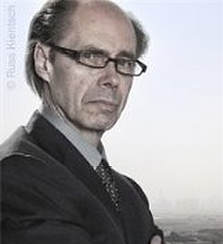 Jeffery DeaverSo does Deaver succeed? Yes and no, and that reflects the range of reviews I've read about the book on Amazon. For the majority of the novel I wasn't that impressed. The characters lacked depth, Deaver giving only the barest details about them, and the writing failed to grab me. Along the way, there are surprises, but no major thrills or twists. In addition, the ending of the opening chapter (number thirty-six, which appears first in the book as this is a story told in reverse) would have been weak had the plot been conventionally ordered, not delivering the final punch thriller readers expect. Whoever reviewed the book for The Sunday Times appears to have the same reaction as me, saying:
Jeffery DeaverSo does Deaver succeed? Yes and no, and that reflects the range of reviews I've read about the book on Amazon. For the majority of the novel I wasn't that impressed. The characters lacked depth, Deaver giving only the barest details about them, and the writing failed to grab me. Along the way, there are surprises, but no major thrills or twists. In addition, the ending of the opening chapter (number thirty-six, which appears first in the book as this is a story told in reverse) would have been weak had the plot been conventionally ordered, not delivering the final punch thriller readers expect. Whoever reviewed the book for The Sunday Times appears to have the same reaction as me, saying:
'Even halfway through, it seems possible that Deaver has been defeated by the mind-boggling technical challenge of delivering surprises in back-to-front time.'
Towards the end, however, everything changes, and I found myself gripped by the twists that Deaver throws into the mix. So does our friend from The Sunday Times:
'After the reverse journey reaches the couple's first meeting, his (Deaver's) gamble is thoroughly vindicated by a series of twists in which he resembles a conjuror who each time seems to have performed his final trick, but then tops it.'
My reaction as well. The final two chapters are particularly gripping, delivering surprises that perhaps I should have seen coming but didn't. By the end, the last part of the book left me thinking, 'Wow!', as well as unsure how to sum it up as a whole. 'The October List' is, by its very nature, plot-driven yet that's no excuse for poorly drawn characters or pedestrian writing. Yet I'm filled with admiration for any novelist who attempts such an ambitious task. Could you conceive of writing a novel backwards?! Deaver says in his foreword that 'The October List' was more challenging than anything he'd previously written - hardly surprising!
Have you read 'The October List?'
I'd be interested to hear what other people think. What's your opinion of 'The October List'? Do you, like one five-star Amazon reviewer, consider it 'brilliantly executed' with 'more surprises than you can shake a stick at'? Or do you side with the one-star reviewer who says, cuttingly, 'An intriguing idea wasted'? Leave a comment and let me know!
Enjoyed this post? Please share via the buttons below:
Get your free copy of His Kidnapper's Shoes! Sign up for my newsletter and you'll receive a free copy of His Kidnapper's Shoes in either Kindle, epub or PDF format! What will you get from my emails? Books from other novelists (with their permission, of course!), reading recommendations, discounts on my future releases, as well as promotions and giveaways. I'll contact you every two months or when I release a new title, and will never divulge your details to any third parties. To sign up, click this link. Thank you!
Sign up for my newsletter and you'll receive a free copy of His Kidnapper's Shoes in either Kindle, epub or PDF format! What will you get from my emails? Books from other novelists (with their permission, of course!), reading recommendations, discounts on my future releases, as well as promotions and giveaways. I'll contact you every two months or when I release a new title, and will never divulge your details to any third parties. To sign up, click this link. Thank you!
Why not subscribe to my blog?If you've enjoyed this post, how about subscribing to my blog via RSS feed or email? Either click the links in my blog sidebar or sign up via Networked Blogs, also in the sidebar. It'll be great to have you on board!
A novel told backwards!
 A while back, I wrote a post about novels with unusual structures (you can read it here), examining books such as B S Johnson's 'The Unfortunates', which consists of twenty-seven chapters that can be read in any order. As a novelist, I'm fascinated by examples of authors stretching the boundaries of what's possible with fiction. Last week, I picked up from the library another novel with an intriguing premise: Jeffery Deaver's 'The October List'.
A while back, I wrote a post about novels with unusual structures (you can read it here), examining books such as B S Johnson's 'The Unfortunates', which consists of twenty-seven chapters that can be read in any order. As a novelist, I'm fascinated by examples of authors stretching the boundaries of what's possible with fiction. Last week, I picked up from the library another novel with an intriguing premise: Jeffery Deaver's 'The October List'.What's unusual about it? Well, the story is told in reverse - sounds weird, I know! The index begins with chapter chapter thirty-six, the story working back through time over the last two days to the first chapter. In his foreword, Deaver explains that he became captivated with the idea of reverse chronology after listening to a radio discussion about Stephen Sondheim's musical 'Merrily We Roll Along', which uses the same idea. Deaver says:
'I began to wonder if it was possible for a thriller writer to pull off a backward-told story that was filled with the cliffhangers, surprises and twists and turns that are, to me, the epitome of good crime fiction. The task of course, is to present the twist before giving the facts that lead up to it and still make the surprise thrilling. It's like telling a joke's punch line first, yet still making the audience laugh as hard as if they'd heard the gag in its proper order.'
Part brilliance, part ho-hum
 Jeffery DeaverSo does Deaver succeed? Yes and no, and that reflects the range of reviews I've read about the book on Amazon. For the majority of the novel I wasn't that impressed. The characters lacked depth, Deaver giving only the barest details about them, and the writing failed to grab me. Along the way, there are surprises, but no major thrills or twists. In addition, the ending of the opening chapter (number thirty-six, which appears first in the book as this is a story told in reverse) would have been weak had the plot been conventionally ordered, not delivering the final punch thriller readers expect. Whoever reviewed the book for The Sunday Times appears to have the same reaction as me, saying:
Jeffery DeaverSo does Deaver succeed? Yes and no, and that reflects the range of reviews I've read about the book on Amazon. For the majority of the novel I wasn't that impressed. The characters lacked depth, Deaver giving only the barest details about them, and the writing failed to grab me. Along the way, there are surprises, but no major thrills or twists. In addition, the ending of the opening chapter (number thirty-six, which appears first in the book as this is a story told in reverse) would have been weak had the plot been conventionally ordered, not delivering the final punch thriller readers expect. Whoever reviewed the book for The Sunday Times appears to have the same reaction as me, saying:'Even halfway through, it seems possible that Deaver has been defeated by the mind-boggling technical challenge of delivering surprises in back-to-front time.'
Towards the end, however, everything changes, and I found myself gripped by the twists that Deaver throws into the mix. So does our friend from The Sunday Times:
'After the reverse journey reaches the couple's first meeting, his (Deaver's) gamble is thoroughly vindicated by a series of twists in which he resembles a conjuror who each time seems to have performed his final trick, but then tops it.'
My reaction as well. The final two chapters are particularly gripping, delivering surprises that perhaps I should have seen coming but didn't. By the end, the last part of the book left me thinking, 'Wow!', as well as unsure how to sum it up as a whole. 'The October List' is, by its very nature, plot-driven yet that's no excuse for poorly drawn characters or pedestrian writing. Yet I'm filled with admiration for any novelist who attempts such an ambitious task. Could you conceive of writing a novel backwards?! Deaver says in his foreword that 'The October List' was more challenging than anything he'd previously written - hardly surprising!
Have you read 'The October List?'
I'd be interested to hear what other people think. What's your opinion of 'The October List'? Do you, like one five-star Amazon reviewer, consider it 'brilliantly executed' with 'more surprises than you can shake a stick at'? Or do you side with the one-star reviewer who says, cuttingly, 'An intriguing idea wasted'? Leave a comment and let me know!
Enjoyed this post? Please share via the buttons below:
Get your free copy of His Kidnapper's Shoes!
 Sign up for my newsletter and you'll receive a free copy of His Kidnapper's Shoes in either Kindle, epub or PDF format! What will you get from my emails? Books from other novelists (with their permission, of course!), reading recommendations, discounts on my future releases, as well as promotions and giveaways. I'll contact you every two months or when I release a new title, and will never divulge your details to any third parties. To sign up, click this link. Thank you!
Sign up for my newsletter and you'll receive a free copy of His Kidnapper's Shoes in either Kindle, epub or PDF format! What will you get from my emails? Books from other novelists (with their permission, of course!), reading recommendations, discounts on my future releases, as well as promotions and giveaways. I'll contact you every two months or when I release a new title, and will never divulge your details to any third parties. To sign up, click this link. Thank you!Why not subscribe to my blog?If you've enjoyed this post, how about subscribing to my blog via RSS feed or email? Either click the links in my blog sidebar or sign up via Networked Blogs, also in the sidebar. It'll be great to have you on board!
Published on January 06, 2016 05:24
December 17, 2015
Interview with my cover designer
By Maggie James
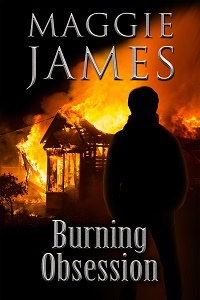 I'm delighted to reveal that the cover for my forthcoming novel, Burning Obsession, has now been completed! I'm now past the halfway mark with writing it; I aim to get the first draft completed by Christmas. Here's a summary of the plot:
I'm delighted to reveal that the cover for my forthcoming novel, Burning Obsession, has now been completed! I'm now past the halfway mark with writing it; I aim to get the first draft completed by Christmas. Here's a summary of the plot:
As a serial arsonist targets Bristol, the body of Ellie Golden is discovered in a burning house. The teenager's distraught relatives descend into accusations; before long a family member is arrested on suspicion of her murder, shattering relationships that are already worn thin. Only Lori, Ellie's sister, believes the police have the wrong man. Meanwhile, whilst grieving for her sister, she struggles to support her mother Louise, for whom Ellie Golden was to have been a living kidney donor. Meanwhile, more fires blaze across the city. Who is burning Bristol, and why are the fires moving ever closer to the Goldens?
The cover for Burning Obsession was designed by Digital Donna, who has done the majority of my fiction covers. I've worked with her now for nearly three years; I lack graphic design skills, so I went looking for someone who could help. Enter Donna, who has proved a delight to work with. I decided to ask her a few questions about cover design.
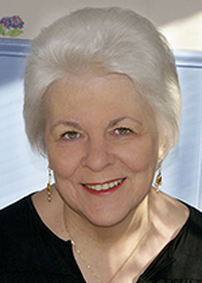 Tell us a little about yourself and how you came to design book covers.
Tell us a little about yourself and how you came to design book covers.
I self-published a novel in 2009 called, A Grizzly End, and when I began looking into places to market it, I found Smashwords.com. They have a ‘style guide’ that helps you get your manuscript formatted, along with contact information for people who do formatting and cover design. Since I had been using Photoshop and other artistic software for many years at that point, I thought, “I can do that!” So I asked the people at Smashwords to add my name to their list of cover artists and that’s how I got my start. I’m better at designing covers than writing, so I’m sticking with it!
What makes a good book cover?
In my opinion, a good book cover is one that gets the basic idea of the book across at a glance. The covers appear in a thumbnail size on the publishers’ websites, so the title has to be easy to read at that size. If the author name is also easy to read, so much the better!
So what makes a bad book cover?
A bad book cover is one that has a lot of confusing images crammed onto it, making it impossible to read the title, even at full size!
Are authors ever unrealistic with their expectations for their covers?
Absolutely! Some authors insist that I find photos of people wearing period costumes and displaying certain emotions on their faces. Those kinds of images are extremely difficult to find and sometimes I have to use the bodies of some people and the heads of others! I have also done some covers where the author micro-manages every pixel. I usually don’t like the end result, but they do…who am I to argue? But, most authors work with me and between the two of us, we find the best design.
Do you judge a book by its cover?
Yes, it’s what makes me take a closer look at the story inside. If I don’t like the cover, I won’t bother. I think most people do the same.
What other services can you offer authors?
I offer several graphics of their books to help them market and display them. See them here:
www.digitaldonna.com/products.htm. I have also done postcards, business cards, bookmarks and Facebook header images.
Thank you, Donna, for talking with me!
Thank you for the interview!
Enjoyed this post? Please share via the links below:
Why not subscribe to my blog?If you've enjoyed this post, how about subscribing to my blog via RSS feed or email? Either click the links in my blog sidebar or sign up via Networked Blogs, also in the sidebar. It'll be great to have you on board!
Get your free copy of His Kidnapper's Shoes!
 Sign up for my newsletter and you'll receive a free copy of His Kidnapper's Shoes in either Kindle, epub or PDF format! What will you get from my emails? Books from other novelists (with their permission, of course!), reading recommendations, discounts on my future releases, as well as promotions and giveaways. I'll contact you every two months or when I release a new title, and will never divulge your details to any third parties. To sign up, click this link. Thank you!
Sign up for my newsletter and you'll receive a free copy of His Kidnapper's Shoes in either Kindle, epub or PDF format! What will you get from my emails? Books from other novelists (with their permission, of course!), reading recommendations, discounts on my future releases, as well as promotions and giveaways. I'll contact you every two months or when I release a new title, and will never divulge your details to any third parties. To sign up, click this link. Thank you!
 I'm delighted to reveal that the cover for my forthcoming novel, Burning Obsession, has now been completed! I'm now past the halfway mark with writing it; I aim to get the first draft completed by Christmas. Here's a summary of the plot:
I'm delighted to reveal that the cover for my forthcoming novel, Burning Obsession, has now been completed! I'm now past the halfway mark with writing it; I aim to get the first draft completed by Christmas. Here's a summary of the plot:As a serial arsonist targets Bristol, the body of Ellie Golden is discovered in a burning house. The teenager's distraught relatives descend into accusations; before long a family member is arrested on suspicion of her murder, shattering relationships that are already worn thin. Only Lori, Ellie's sister, believes the police have the wrong man. Meanwhile, whilst grieving for her sister, she struggles to support her mother Louise, for whom Ellie Golden was to have been a living kidney donor. Meanwhile, more fires blaze across the city. Who is burning Bristol, and why are the fires moving ever closer to the Goldens?
The cover for Burning Obsession was designed by Digital Donna, who has done the majority of my fiction covers. I've worked with her now for nearly three years; I lack graphic design skills, so I went looking for someone who could help. Enter Donna, who has proved a delight to work with. I decided to ask her a few questions about cover design.
 Tell us a little about yourself and how you came to design book covers.
Tell us a little about yourself and how you came to design book covers.
I self-published a novel in 2009 called, A Grizzly End, and when I began looking into places to market it, I found Smashwords.com. They have a ‘style guide’ that helps you get your manuscript formatted, along with contact information for people who do formatting and cover design. Since I had been using Photoshop and other artistic software for many years at that point, I thought, “I can do that!” So I asked the people at Smashwords to add my name to their list of cover artists and that’s how I got my start. I’m better at designing covers than writing, so I’m sticking with it!
What makes a good book cover?
In my opinion, a good book cover is one that gets the basic idea of the book across at a glance. The covers appear in a thumbnail size on the publishers’ websites, so the title has to be easy to read at that size. If the author name is also easy to read, so much the better!
So what makes a bad book cover?
A bad book cover is one that has a lot of confusing images crammed onto it, making it impossible to read the title, even at full size!
Are authors ever unrealistic with their expectations for their covers?
Absolutely! Some authors insist that I find photos of people wearing period costumes and displaying certain emotions on their faces. Those kinds of images are extremely difficult to find and sometimes I have to use the bodies of some people and the heads of others! I have also done some covers where the author micro-manages every pixel. I usually don’t like the end result, but they do…who am I to argue? But, most authors work with me and between the two of us, we find the best design.
Do you judge a book by its cover?
Yes, it’s what makes me take a closer look at the story inside. If I don’t like the cover, I won’t bother. I think most people do the same.
What other services can you offer authors?
I offer several graphics of their books to help them market and display them. See them here:
www.digitaldonna.com/products.htm. I have also done postcards, business cards, bookmarks and Facebook header images.
Thank you, Donna, for talking with me!
Thank you for the interview!
Enjoyed this post? Please share via the links below:
Why not subscribe to my blog?If you've enjoyed this post, how about subscribing to my blog via RSS feed or email? Either click the links in my blog sidebar or sign up via Networked Blogs, also in the sidebar. It'll be great to have you on board!
Get your free copy of His Kidnapper's Shoes!
 Sign up for my newsletter and you'll receive a free copy of His Kidnapper's Shoes in either Kindle, epub or PDF format! What will you get from my emails? Books from other novelists (with their permission, of course!), reading recommendations, discounts on my future releases, as well as promotions and giveaways. I'll contact you every two months or when I release a new title, and will never divulge your details to any third parties. To sign up, click this link. Thank you!
Sign up for my newsletter and you'll receive a free copy of His Kidnapper's Shoes in either Kindle, epub or PDF format! What will you get from my emails? Books from other novelists (with their permission, of course!), reading recommendations, discounts on my future releases, as well as promotions and giveaways. I'll contact you every two months or when I release a new title, and will never divulge your details to any third parties. To sign up, click this link. Thank you!
Published on December 17, 2015 03:05
December 10, 2015
Book review - The Bazaar of Bad Dreams by Stephen King
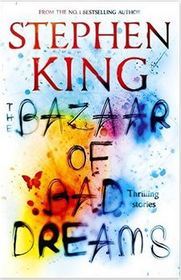 Over the years, I've come to admire Stephen King more and more, both for his prolific output and the amazing quality of his work. I've especially enjoyed his longer novels, such as 11.22.63, marvelling at how he maintains tension and interest for 700+ pages. I wasn't sure, therefore, what I'd think of King's short stories, although I suspect I could read his grocery list and find it enthralling!
Over the years, I've come to admire Stephen King more and more, both for his prolific output and the amazing quality of his work. I've especially enjoyed his longer novels, such as 11.22.63, marvelling at how he maintains tension and interest for 700+ pages. I wasn't sure, therefore, what I'd think of King's short stories, although I suspect I could read his grocery list and find it enthralling!I needn't have worried - I loved Full Dark, No Stars, a great collection and one that inspired me to try his latest offering, The Bazaar of Bad Dreams, published in November 2015. It's a collection of eighteen short stories and two poems. (Poetry isn't my thing - I started both poems and gave up, so perhaps I overstated my case when it comes to King's grocery list!)
It's worth noting that not all the stories are new; some, such as Blockade Billy, have been published before, which may disappoint diehard fans expecting a completely fresh experience. They were all new to me, however, so no complaints here!
I love how King prefaces each story with an introduction, often revealing where he got his inspiration. As an author myself, it's fascinating to explore another wordsmith's process for transferring an idea from brain to page. Mile 81, for example, is a reworking of a story King wrote nearly forty years ago, resulting from his dislike of a particularly lonely stretch of road in Maine, familiar from his university days. For Batman and Robin Have an Altercation, he drew on a memory of a near-miss accident at a Sarasota intersection. The best introduction, however, is the one to the book itself. Here's a snippet from what King has to say:
'Here, sit down beside me. And do come a little closer, I don't bite.
Except.... we've known each other for a very long time, and I suspect you know that's not entirely true.'
An impressive collection of wonderful quality
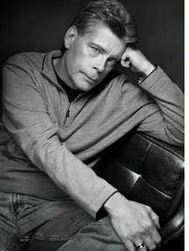 Photo courtesy of AmazonSo what can the reader expect from The Bazaar of Bad Dreams? Some of the stories, like Mile 81 and Bad Little Kid, are quintessentially Stephen King - a demonic flesh-eating car reminiscent of his novel Christine in the first, an evil child in the second. Others, like The Little Green God of Agony, are more personal; in King's own words, a search for closure. The story resulted from the horrific traffic accident he suffered in 1999 that resulted in years of physiotherapy and learning to walk again. In keeping with the personal theme, his preface to Afterlife, an examination of what might come after death, King admits to an increasing interest in the subject as he grows older (he's now 68). The story reflects his preoccupation but delivered with a humorous touch. What awaits Bill Andrews after his demise is not a date with St Peter but with a man in high-waisted trousers, who's none too pleased to see him...
Photo courtesy of AmazonSo what can the reader expect from The Bazaar of Bad Dreams? Some of the stories, like Mile 81 and Bad Little Kid, are quintessentially Stephen King - a demonic flesh-eating car reminiscent of his novel Christine in the first, an evil child in the second. Others, like The Little Green God of Agony, are more personal; in King's own words, a search for closure. The story resulted from the horrific traffic accident he suffered in 1999 that resulted in years of physiotherapy and learning to walk again. In keeping with the personal theme, his preface to Afterlife, an examination of what might come after death, King admits to an increasing interest in the subject as he grows older (he's now 68). The story reflects his preoccupation but delivered with a humorous touch. What awaits Bill Andrews after his demise is not a date with St Peter but with a man in high-waisted trousers, who's none too pleased to see him...My favourite is, I think, Ur, although it's a tough choice! Ur deals with, of all things, a supernatural Kindle, which proves that a good author can weave a tale out of just about anything. Talking of which, the preface to Mr Yummy intrigued me. I can't imagine telling Stephen King he wouldn't have anything new to say about AIDS, especially as a straight man! A friend of his did just that, with King, of course, proving him wrong with his wonderful story of a elderly gay man approaching his death in a care home.
What else gets the King touch? Marriage, in Premium Harmony, Under the Weather and Morality; human stupidity in Drunken Fireworks; and a post-apocalyptic world in Summer Thunder, a moving tale of a man and his dog that incorporates King's love of motorcycles. Blockade Billy is centred around baseball, but with a dark twist. I loved The Dune, a tale of supernatural writing and a study of a deeply unpleasant man. Stephen says the story has one of his favourite endings and I agree; it's a cracker! Simple, inevitable, and highly effective.
In short, there's something here for every King fan, whether old or new. This is an impressive collection of wonderful quality from a writer whose talent, after forty years, has been honed to a razor's edge.
Enjoyed this post? Please share via the links below:
Why not subscribe to my blog?
If you've enjoyed this post, how about subscribing to my blog via RSS feed or email? Either click the links in my blog sidebar or sign up via Networked Blogs, also in the sidebar. It'll be great to have you on board!Get your free copy of His Kidnapper's Shoes!
 Sign up for my newsletter and you'll receive a free copy of His Kidnapper's Shoes in either Kindle, epub or PDF format! What will you get from my emails? Books from other novelists (with their permission, of course!), reading recommendations, discounts on my future releases, as well as promotions and giveaways. I'll contact you every two months or when I release a new title, and will never divulge your details to any third parties. To sign up, click this link. Thank you!
Sign up for my newsletter and you'll receive a free copy of His Kidnapper's Shoes in either Kindle, epub or PDF format! What will you get from my emails? Books from other novelists (with their permission, of course!), reading recommendations, discounts on my future releases, as well as promotions and giveaways. I'll contact you every two months or when I release a new title, and will never divulge your details to any third parties. To sign up, click this link. Thank you!
Published on December 10, 2015 06:49
December 3, 2015
How my book sales help those less fortunate
By Maggie James
 Photo courtesy of LendwithcareOne year ago, I became a full-time novelist. Those who know me will understand how happy that makes me! I am incredibly lucky and privileged to do what I love for a living, and I'm keen to give something back.
Photo courtesy of LendwithcareOne year ago, I became a full-time novelist. Those who know me will understand how happy that makes me! I am incredibly lucky and privileged to do what I love for a living, and I'm keen to give something back.
Here's what I do. At the end of every month, Amazon credits my earnings from my book sales into my bank account; I then take 10% and donate it to charity. However, I wanted to do something a little different other than making an online donation every month. Enter Lendwithcare, a microfinance institution. For those of you who haven't come across the concept before, here's a brief explanation.
Microfinance is a great way to help some of the world’s poorest people work their way out of poverty. Lendwithcare allows donors to lend as little as £15 to fund a small business; once the money is repaid they can recycle the loan to support someone else or withdraw the money. 100% of the funds loaned through Lendwithcare goes to the entrepreneur; the organisation is financed via donations, and every time I make a loan I also give to Lendwithcare as well.
Is it ethical? Yes. Lendwithcare only partners with microfinance institutions that charge fair interest rates, as well as reviewing loans to ensure the recipient businesses are socially responsible, ethical and environmentally friendly.What sort of people does Lendwithcare help?
 Photo courtesy of LendwithcareSo whom is microfinance aimed at? It's designed for poor and low-income people who have limited or no access to the services provided by institutions such as banks. Since few salaried work opportunities exist, loan recipients are usually self-employed microentrepreneurs working from home. They operate businesses such as grocery shops, market stalls, car workshops and agricultural pursuits such as raising livestock and growing food. Around two-thirds of microfinance recipients worldwide are women.
Photo courtesy of LendwithcareSo whom is microfinance aimed at? It's designed for poor and low-income people who have limited or no access to the services provided by institutions such as banks. Since few salaried work opportunities exist, loan recipients are usually self-employed microentrepreneurs working from home. They operate businesses such as grocery shops, market stalls, car workshops and agricultural pursuits such as raising livestock and growing food. Around two-thirds of microfinance recipients worldwide are women.
I love Lendwithcare because I can see exactly where my money goes and whom it helps. Once I log into the website, my dashboard informs me that so far I've assisted 22 entrepreneurs, in turn benefitting 62 family members and creating 24 jobs. This month I loaned money to a Pakistani man so he could repair his rickshaw and to a Pakistani woman to purchase supplies for her textile business.
How do I choose whom to help? After my trip to Asia earlier this year, I supported a lot of people from Cambodia because I enjoyed my travels there so much. Sometimes I pick entrepreneurs who are close to being fully funded for the loans they require; it's great to get an email telling me that someone I've chosen now has the loan they require. It doesn't really matter - whatever my criteria, my money goes to help those who need it.
What makes it even better is that, as the loans get repaid, I can then use that money to finance new ones. The funds get recycled, so as time progresses the amount I contribute increases. A win all round! It is a pleasure to send money to my Lendwithcare account each month.
Thank you to those people who have bought my books, because you've made this possible. I am deeply grateful to each and every one of you.Want to know more?
Like to get involved? Click this link to go the the Lendwithcare website, where you can donate as little as £15 to someone less fortunate.Enjoyed this post? Please share via the links below:
Why not subscribe to my blog?
If you've enjoyed this post, how about subscribing to my blog via RSS feed or email? Either click the links in my blog sidebar or sign up via Networked Blogs, also in the sidebar. It'll be great to have you on board!Get your free copy of His Kidnapper's Shoes!
 Sign up for my newsletter and you'll receive a free copy of His Kidnapper's Shoes in either Kindle, epub or PDF format! What will you get from my emails? Books from other novelists (with their permission, of course!), reading recommendations, discounts on my future releases, as well as promotions and giveaways. I'll contact you every two months or when I release a new title, and will never divulge your details to any third parties. To sign up, click this link. Thank you!
Sign up for my newsletter and you'll receive a free copy of His Kidnapper's Shoes in either Kindle, epub or PDF format! What will you get from my emails? Books from other novelists (with their permission, of course!), reading recommendations, discounts on my future releases, as well as promotions and giveaways. I'll contact you every two months or when I release a new title, and will never divulge your details to any third parties. To sign up, click this link. Thank you!
 Photo courtesy of LendwithcareOne year ago, I became a full-time novelist. Those who know me will understand how happy that makes me! I am incredibly lucky and privileged to do what I love for a living, and I'm keen to give something back.
Photo courtesy of LendwithcareOne year ago, I became a full-time novelist. Those who know me will understand how happy that makes me! I am incredibly lucky and privileged to do what I love for a living, and I'm keen to give something back.Here's what I do. At the end of every month, Amazon credits my earnings from my book sales into my bank account; I then take 10% and donate it to charity. However, I wanted to do something a little different other than making an online donation every month. Enter Lendwithcare, a microfinance institution. For those of you who haven't come across the concept before, here's a brief explanation.
Microfinance is a great way to help some of the world’s poorest people work their way out of poverty. Lendwithcare allows donors to lend as little as £15 to fund a small business; once the money is repaid they can recycle the loan to support someone else or withdraw the money. 100% of the funds loaned through Lendwithcare goes to the entrepreneur; the organisation is financed via donations, and every time I make a loan I also give to Lendwithcare as well.
Is it ethical? Yes. Lendwithcare only partners with microfinance institutions that charge fair interest rates, as well as reviewing loans to ensure the recipient businesses are socially responsible, ethical and environmentally friendly.What sort of people does Lendwithcare help?
 Photo courtesy of LendwithcareSo whom is microfinance aimed at? It's designed for poor and low-income people who have limited or no access to the services provided by institutions such as banks. Since few salaried work opportunities exist, loan recipients are usually self-employed microentrepreneurs working from home. They operate businesses such as grocery shops, market stalls, car workshops and agricultural pursuits such as raising livestock and growing food. Around two-thirds of microfinance recipients worldwide are women.
Photo courtesy of LendwithcareSo whom is microfinance aimed at? It's designed for poor and low-income people who have limited or no access to the services provided by institutions such as banks. Since few salaried work opportunities exist, loan recipients are usually self-employed microentrepreneurs working from home. They operate businesses such as grocery shops, market stalls, car workshops and agricultural pursuits such as raising livestock and growing food. Around two-thirds of microfinance recipients worldwide are women.I love Lendwithcare because I can see exactly where my money goes and whom it helps. Once I log into the website, my dashboard informs me that so far I've assisted 22 entrepreneurs, in turn benefitting 62 family members and creating 24 jobs. This month I loaned money to a Pakistani man so he could repair his rickshaw and to a Pakistani woman to purchase supplies for her textile business.
How do I choose whom to help? After my trip to Asia earlier this year, I supported a lot of people from Cambodia because I enjoyed my travels there so much. Sometimes I pick entrepreneurs who are close to being fully funded for the loans they require; it's great to get an email telling me that someone I've chosen now has the loan they require. It doesn't really matter - whatever my criteria, my money goes to help those who need it.
What makes it even better is that, as the loans get repaid, I can then use that money to finance new ones. The funds get recycled, so as time progresses the amount I contribute increases. A win all round! It is a pleasure to send money to my Lendwithcare account each month.
Thank you to those people who have bought my books, because you've made this possible. I am deeply grateful to each and every one of you.Want to know more?
Like to get involved? Click this link to go the the Lendwithcare website, where you can donate as little as £15 to someone less fortunate.Enjoyed this post? Please share via the links below:
Why not subscribe to my blog?
If you've enjoyed this post, how about subscribing to my blog via RSS feed or email? Either click the links in my blog sidebar or sign up via Networked Blogs, also in the sidebar. It'll be great to have you on board!Get your free copy of His Kidnapper's Shoes!
 Sign up for my newsletter and you'll receive a free copy of His Kidnapper's Shoes in either Kindle, epub or PDF format! What will you get from my emails? Books from other novelists (with their permission, of course!), reading recommendations, discounts on my future releases, as well as promotions and giveaways. I'll contact you every two months or when I release a new title, and will never divulge your details to any third parties. To sign up, click this link. Thank you!
Sign up for my newsletter and you'll receive a free copy of His Kidnapper's Shoes in either Kindle, epub or PDF format! What will you get from my emails? Books from other novelists (with their permission, of course!), reading recommendations, discounts on my future releases, as well as promotions and giveaways. I'll contact you every two months or when I release a new title, and will never divulge your details to any third parties. To sign up, click this link. Thank you!
Published on December 03, 2015 05:41
November 17, 2015
Five novels based on travel
By Maggie James
Anyone who knows me will testify how passionate I am about foreigh travel. I've been fortunate enough to have done lots of globe-trotting in my life, with more trips planned; it makes sense, therefore, that a keen reader like me should enjoy novels based around travel. In this week's post, I examine as part of my 'Five' series some well-known books classed as travel fiction or memoirs. Commencing take-off....
1. The Beach - Alex Garland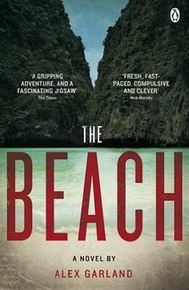 Written in 1996 by British author Alex Garland, The Beach tells the story of Richard, who, when the novel opens, is staying in the notorious Khao San Road area of Bangkok (I've spent many a happy hour exploring Khao San's peculiarities - I love the place!) He becomes fascinated by what he hears about a remote beach situated in the Gulf of Thailand, described as stunningly beautiful and inaccessible to tourists. Daffy Duck, the Scotsman who tells him about this tropical Garden of Eden, leaves him a map disclosing its location before committing suicide. Intrigued, Richard hooks up with a French couple, Etienne and Francois, and the trio set off to find the beach.
Written in 1996 by British author Alex Garland, The Beach tells the story of Richard, who, when the novel opens, is staying in the notorious Khao San Road area of Bangkok (I've spent many a happy hour exploring Khao San's peculiarities - I love the place!) He becomes fascinated by what he hears about a remote beach situated in the Gulf of Thailand, described as stunningly beautiful and inaccessible to tourists. Daffy Duck, the Scotsman who tells him about this tropical Garden of Eden, leaves him a map disclosing its location before committing suicide. Intrigued, Richard hooks up with a French couple, Etienne and Francois, and the trio set off to find the beach.
Once there, they discover a secretive community living alongside Thai cannabis growers. Events, of course, soon take a sinister turn - I won't say more as I don't wish to give plot spoilers, but at times The Beach has distinct overtones of William Golding's Lord of the Flies. The body count grows amid the backdrop of the annual Tet Festival. Will Richard survive the experience?
2. On The Road - Jack Kerouac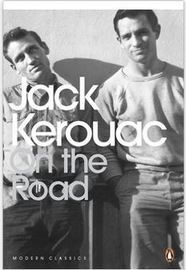 Written in 1951 but not published until 1957, On The Road is a novel by Jack Kerouac, based on his travels across America. The story epitomises the post-war Beat and counter-culture movements, being heavily based around spiritual quests and the rejection of materialism, and laced with copious amounts of jazz music, sexual exploits and psychedelic drugs.
Written in 1951 but not published until 1957, On The Road is a novel by Jack Kerouac, based on his travels across America. The story epitomises the post-war Beat and counter-culture movements, being heavily based around spiritual quests and the rejection of materialism, and laced with copious amounts of jazz music, sexual exploits and psychedelic drugs.
Kerouac emerges in the book as the narrator, Sal Paradise, who embarks on a road trip with his friend Dean Moriarty (based on Neal Cassady, another major figure of the Beat movement.) Saddened by his recent divorce, Sal is eager to accompany the free-spirited Dean and discover what life on the road can offer him. They criss-cross the country from coast to coast, hitting San Fransisco, New York, New Orleans, Denver and Detroit. As someone who has long held an ambition to drive across the USA, this fascinates me!
A weird fact about On The Road - the first draft was typed on a continuous 120-feet long scroll of tracing paper sheets, cut to size and taped together. The novel was transcribed from Kerouac's notebooks and typed without margins or paragraph breaks, taking him just three weeks (wow, that's fast!) to complete . I can only assume he couldn't afford proper paper on which to type! The scroll still exists and was bought by the owner of the Indianapolis Colts for $2.43 million in 2001.
3. Eat, Pray, Love - Elizabeth Gilbert
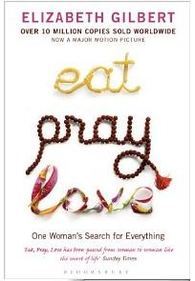 Eat, Pray, Love was written in 2006 by American author Elizabeth Gilbert and tells the story of her travels following her divorce and unsuccessful rebound relationship. The book is split into three sections, each corresponding with a different location in Gilbert's travels. First she spent four months in Italy, eating and enjoying life, which is the 'eat' section of the narrative. As a foodie and Italiophile, I love this part! Next came three months in India, where Gilbert explores her spirituality ('pray'). Finally she travelled to Bali, where she fell in love with a Brazilian businessman ('love'), whom she subsequently married.
Eat, Pray, Love was written in 2006 by American author Elizabeth Gilbert and tells the story of her travels following her divorce and unsuccessful rebound relationship. The book is split into three sections, each corresponding with a different location in Gilbert's travels. First she spent four months in Italy, eating and enjoying life, which is the 'eat' section of the narrative. As a foodie and Italiophile, I love this part! Next came three months in India, where Gilbert explores her spirituality ('pray'). Finally she travelled to Bali, where she fell in love with a Brazilian businessman ('love'), whom she subsequently married.
The book has attracted mixed reviews, with many being critical of Gilbert's alleged self-absorption. Others, like Oprah Winfrey, have loved the memoir (Oprah devoted two episodes of her show to it) and the 2010 film version has also proved very popular. Gilbert has also written another memoir (Committed: A Skeptic Makes Peace With Marriage) as a sequel to Eat, Pray, Love, as well as short stories, essays and novels.
4. Around The World In Eighty Days - Jules Verne
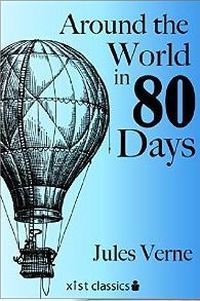 Ah, the classic Jules Verne novel, beloved since its publication in 1873! The book tells the story of Phileas Fogg and his valet Passepartout as they attempt to win a £20,000 bet as to whether the pair can circumnavigate the globe in eighty days. The traveller in me thrills at the challenge - perhaps I should give it a go sometime!
Ah, the classic Jules Verne novel, beloved since its publication in 1873! The book tells the story of Phileas Fogg and his valet Passepartout as they attempt to win a £20,000 bet as to whether the pair can circumnavigate the globe in eighty days. The traveller in me thrills at the challenge - perhaps I should give it a go sometime!
Fogg and Passepartout travel by rail and steamer, journeying first to Egypt, then to India, Hong Kong, Japan and the USA before crossing the Atlantic back to London. Despite what you see on the book cover, they never set foot in a balloon - the idea is brought up in one of the chapters but dismissed as being too risky. The image of a balloon has become synonymous with the book, however, thanks to the 1956 film adaptation.
Many people have since circumnavigated the world in eighty days or less, including British actor and fellow travel-holic Michael Palin, who made the trip in seventy-nine days as part of a very entertaining 1989 TV travel documentary.
5. Backpack - Emily Barr
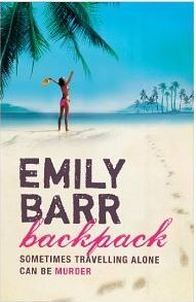 This novel brings back memories! I came across it in a hostel in the beach resort of Mui Ne in southern Vietnam, and read it in one go whilst stretched out on a lounger next to the sea. Happy days! Here's the synopsis:
This novel brings back memories! I came across it in a hostel in the beach resort of Mui Ne in southern Vietnam, and read it in one go whilst stretched out on a lounger next to the sea. Happy days! Here's the synopsis:
It's New Year's Day and the year isn't kicking off well for Tansy: her mother's dead, she's a cocaine addict and her boyfriend has just left her. A trip around the world seems like the only option except that she's not interested in seeing the world, just escaping from it, and the last people she wants to hang out with are backpackers.
Like a lot of travellers on the Lonely-Planet-led Asian Grand Tour, Tansy is intensely irritating at first. Always on the look out for the "real" Vietnam--the one in which she can walk around "like a model, fanning myself gently, strolling into ancient temples and learning about inner peace"--she is opinionated, narrow-minded and remarkably naive (for a supposed media luvvy). Once she has shrugged off her addiction to lines of coke, skinny lattes and Nicole Fahri jumpers, she becomes more appealing. So by the time she's fallen for Max, a fellow traveller, she'll have won you over and you'll be just as worried as she is about the serial killer who appears to be on her trail...Let's hear from you!
Wow, this post has made me want to pack my rucksack! Have you read any of the books I've mentioned? Any other travel-based books that you love? Leave a comment and let me know!
Enjoyed this post? Please share via the links below:
Get your free copy of HIs Kidnapper's Shoes!
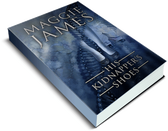 Sign up for my newsletter and you'll receive a free copy of His Kidnapper's Shoes in either Kindle, epub or PDF format! What will you get from my emails? Books from other novelists (with their permission, of course!), reading recommendations, discounts on my future releases, as well as promotions and giveaways. I'll contact you every two months or when I release a new title, and will never divulge your details to any third parties. To sign up, enter your email address in the box in the sidebar. Thank you!Why not subscribe to my blog?If you've enjoyed this post, how about subscribing to my blog via RSS feed or email? Either click the links in my blog sidebar or sign up via Networked Blogs, also in the sidebar. It'll be great to have you on board!
Sign up for my newsletter and you'll receive a free copy of His Kidnapper's Shoes in either Kindle, epub or PDF format! What will you get from my emails? Books from other novelists (with their permission, of course!), reading recommendations, discounts on my future releases, as well as promotions and giveaways. I'll contact you every two months or when I release a new title, and will never divulge your details to any third parties. To sign up, enter your email address in the box in the sidebar. Thank you!Why not subscribe to my blog?If you've enjoyed this post, how about subscribing to my blog via RSS feed or email? Either click the links in my blog sidebar or sign up via Networked Blogs, also in the sidebar. It'll be great to have you on board!
Anyone who knows me will testify how passionate I am about foreigh travel. I've been fortunate enough to have done lots of globe-trotting in my life, with more trips planned; it makes sense, therefore, that a keen reader like me should enjoy novels based around travel. In this week's post, I examine as part of my 'Five' series some well-known books classed as travel fiction or memoirs. Commencing take-off....
1. The Beach - Alex Garland
 Written in 1996 by British author Alex Garland, The Beach tells the story of Richard, who, when the novel opens, is staying in the notorious Khao San Road area of Bangkok (I've spent many a happy hour exploring Khao San's peculiarities - I love the place!) He becomes fascinated by what he hears about a remote beach situated in the Gulf of Thailand, described as stunningly beautiful and inaccessible to tourists. Daffy Duck, the Scotsman who tells him about this tropical Garden of Eden, leaves him a map disclosing its location before committing suicide. Intrigued, Richard hooks up with a French couple, Etienne and Francois, and the trio set off to find the beach.
Written in 1996 by British author Alex Garland, The Beach tells the story of Richard, who, when the novel opens, is staying in the notorious Khao San Road area of Bangkok (I've spent many a happy hour exploring Khao San's peculiarities - I love the place!) He becomes fascinated by what he hears about a remote beach situated in the Gulf of Thailand, described as stunningly beautiful and inaccessible to tourists. Daffy Duck, the Scotsman who tells him about this tropical Garden of Eden, leaves him a map disclosing its location before committing suicide. Intrigued, Richard hooks up with a French couple, Etienne and Francois, and the trio set off to find the beach.Once there, they discover a secretive community living alongside Thai cannabis growers. Events, of course, soon take a sinister turn - I won't say more as I don't wish to give plot spoilers, but at times The Beach has distinct overtones of William Golding's Lord of the Flies. The body count grows amid the backdrop of the annual Tet Festival. Will Richard survive the experience?
2. On The Road - Jack Kerouac
 Written in 1951 but not published until 1957, On The Road is a novel by Jack Kerouac, based on his travels across America. The story epitomises the post-war Beat and counter-culture movements, being heavily based around spiritual quests and the rejection of materialism, and laced with copious amounts of jazz music, sexual exploits and psychedelic drugs.
Written in 1951 but not published until 1957, On The Road is a novel by Jack Kerouac, based on his travels across America. The story epitomises the post-war Beat and counter-culture movements, being heavily based around spiritual quests and the rejection of materialism, and laced with copious amounts of jazz music, sexual exploits and psychedelic drugs.Kerouac emerges in the book as the narrator, Sal Paradise, who embarks on a road trip with his friend Dean Moriarty (based on Neal Cassady, another major figure of the Beat movement.) Saddened by his recent divorce, Sal is eager to accompany the free-spirited Dean and discover what life on the road can offer him. They criss-cross the country from coast to coast, hitting San Fransisco, New York, New Orleans, Denver and Detroit. As someone who has long held an ambition to drive across the USA, this fascinates me!
A weird fact about On The Road - the first draft was typed on a continuous 120-feet long scroll of tracing paper sheets, cut to size and taped together. The novel was transcribed from Kerouac's notebooks and typed without margins or paragraph breaks, taking him just three weeks (wow, that's fast!) to complete . I can only assume he couldn't afford proper paper on which to type! The scroll still exists and was bought by the owner of the Indianapolis Colts for $2.43 million in 2001.
3. Eat, Pray, Love - Elizabeth Gilbert
 Eat, Pray, Love was written in 2006 by American author Elizabeth Gilbert and tells the story of her travels following her divorce and unsuccessful rebound relationship. The book is split into three sections, each corresponding with a different location in Gilbert's travels. First she spent four months in Italy, eating and enjoying life, which is the 'eat' section of the narrative. As a foodie and Italiophile, I love this part! Next came three months in India, where Gilbert explores her spirituality ('pray'). Finally she travelled to Bali, where she fell in love with a Brazilian businessman ('love'), whom she subsequently married.
Eat, Pray, Love was written in 2006 by American author Elizabeth Gilbert and tells the story of her travels following her divorce and unsuccessful rebound relationship. The book is split into three sections, each corresponding with a different location in Gilbert's travels. First she spent four months in Italy, eating and enjoying life, which is the 'eat' section of the narrative. As a foodie and Italiophile, I love this part! Next came three months in India, where Gilbert explores her spirituality ('pray'). Finally she travelled to Bali, where she fell in love with a Brazilian businessman ('love'), whom she subsequently married.The book has attracted mixed reviews, with many being critical of Gilbert's alleged self-absorption. Others, like Oprah Winfrey, have loved the memoir (Oprah devoted two episodes of her show to it) and the 2010 film version has also proved very popular. Gilbert has also written another memoir (Committed: A Skeptic Makes Peace With Marriage) as a sequel to Eat, Pray, Love, as well as short stories, essays and novels.
4. Around The World In Eighty Days - Jules Verne
 Ah, the classic Jules Verne novel, beloved since its publication in 1873! The book tells the story of Phileas Fogg and his valet Passepartout as they attempt to win a £20,000 bet as to whether the pair can circumnavigate the globe in eighty days. The traveller in me thrills at the challenge - perhaps I should give it a go sometime!
Ah, the classic Jules Verne novel, beloved since its publication in 1873! The book tells the story of Phileas Fogg and his valet Passepartout as they attempt to win a £20,000 bet as to whether the pair can circumnavigate the globe in eighty days. The traveller in me thrills at the challenge - perhaps I should give it a go sometime!Fogg and Passepartout travel by rail and steamer, journeying first to Egypt, then to India, Hong Kong, Japan and the USA before crossing the Atlantic back to London. Despite what you see on the book cover, they never set foot in a balloon - the idea is brought up in one of the chapters but dismissed as being too risky. The image of a balloon has become synonymous with the book, however, thanks to the 1956 film adaptation.
Many people have since circumnavigated the world in eighty days or less, including British actor and fellow travel-holic Michael Palin, who made the trip in seventy-nine days as part of a very entertaining 1989 TV travel documentary.
5. Backpack - Emily Barr
 This novel brings back memories! I came across it in a hostel in the beach resort of Mui Ne in southern Vietnam, and read it in one go whilst stretched out on a lounger next to the sea. Happy days! Here's the synopsis:
This novel brings back memories! I came across it in a hostel in the beach resort of Mui Ne in southern Vietnam, and read it in one go whilst stretched out on a lounger next to the sea. Happy days! Here's the synopsis:It's New Year's Day and the year isn't kicking off well for Tansy: her mother's dead, she's a cocaine addict and her boyfriend has just left her. A trip around the world seems like the only option except that she's not interested in seeing the world, just escaping from it, and the last people she wants to hang out with are backpackers.
Like a lot of travellers on the Lonely-Planet-led Asian Grand Tour, Tansy is intensely irritating at first. Always on the look out for the "real" Vietnam--the one in which she can walk around "like a model, fanning myself gently, strolling into ancient temples and learning about inner peace"--she is opinionated, narrow-minded and remarkably naive (for a supposed media luvvy). Once she has shrugged off her addiction to lines of coke, skinny lattes and Nicole Fahri jumpers, she becomes more appealing. So by the time she's fallen for Max, a fellow traveller, she'll have won you over and you'll be just as worried as she is about the serial killer who appears to be on her trail...Let's hear from you!
Wow, this post has made me want to pack my rucksack! Have you read any of the books I've mentioned? Any other travel-based books that you love? Leave a comment and let me know!
Enjoyed this post? Please share via the links below:
Get your free copy of HIs Kidnapper's Shoes!
 Sign up for my newsletter and you'll receive a free copy of His Kidnapper's Shoes in either Kindle, epub or PDF format! What will you get from my emails? Books from other novelists (with their permission, of course!), reading recommendations, discounts on my future releases, as well as promotions and giveaways. I'll contact you every two months or when I release a new title, and will never divulge your details to any third parties. To sign up, enter your email address in the box in the sidebar. Thank you!Why not subscribe to my blog?If you've enjoyed this post, how about subscribing to my blog via RSS feed or email? Either click the links in my blog sidebar or sign up via Networked Blogs, also in the sidebar. It'll be great to have you on board!
Sign up for my newsletter and you'll receive a free copy of His Kidnapper's Shoes in either Kindle, epub or PDF format! What will you get from my emails? Books from other novelists (with their permission, of course!), reading recommendations, discounts on my future releases, as well as promotions and giveaways. I'll contact you every two months or when I release a new title, and will never divulge your details to any third parties. To sign up, enter your email address in the box in the sidebar. Thank you!Why not subscribe to my blog?If you've enjoyed this post, how about subscribing to my blog via RSS feed or email? Either click the links in my blog sidebar or sign up via Networked Blogs, also in the sidebar. It'll be great to have you on board!
Published on November 17, 2015 08:30



